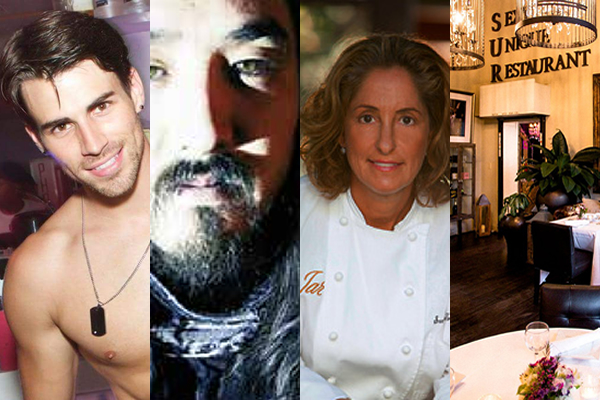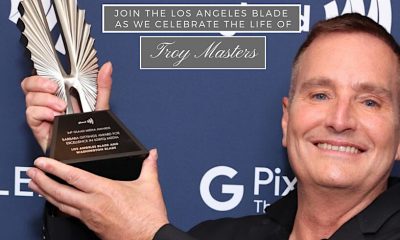a&e features
2018 Best of Gay LA Awards
All of your favorites, from bartenders to activists and more
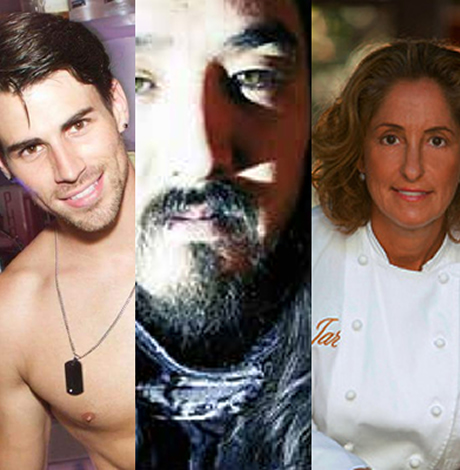
Welcome to the inaugural Best Of Gay LA Awards presented by the Los Angeles Blade. There were hundreds of nominations in 25 categories and thousands of votes. Here we present your picks for the best LA has to offer along with editors’ choices in most categories.
LOCAL HERO: JON DAVIDSON
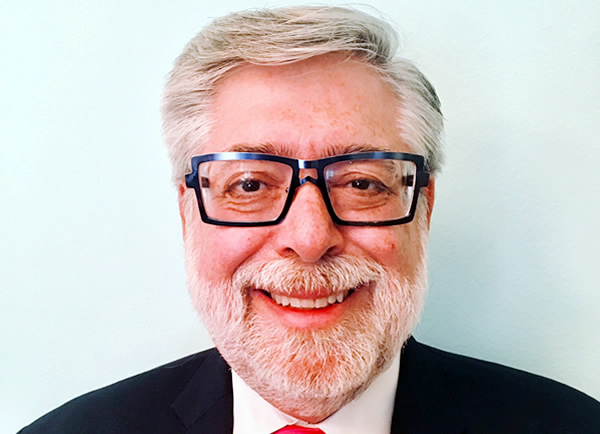
Jon Davidson (Photo courtesy of Davidson)
Jon Davidson has been fighting for the rights of the underdog for most of his adult life.
An attorney focused on the LGBTQ community and people living with HIV, virtually since graduating from Yale Law School in 1979, Davidson has fought and won some of the most important cases facing LGBT Americans. But, as he says, ultimately it’s not whether you win or lose, but how you play the long game.
“What I’ve learned is that one of the realities of doing the LGBT rights litigation that I’ve spent most of my career doing, is that sometimes you can lose the case, but still win. Because those sorts of cases end up educating people about the things that are wrong,” Davidson told the Los Angeles Blade.
He became interested in politics in high school, around the time of Stonewall. He was boycotting grapes and lettuce in support of California farm workers and he protested the Vietnam War. He says he was excited about political change. He started taking cases pro bono.
His first big case was no small potatoes. He sued the city of Los Angeles on behalf of homeless people. Not long after, he says, in 1985 a lot of his friends started to get sick. He started looking for a way he could help.
Davidson teamed up with attorney and activist Susan McGreevy, who was at the ACLU at the time. She enlisted his help in writing the first brief to the U.S. Supreme Court about AIDS. It was about whether people with contagious diseases could be considered disabled and protected against discrimination under a law called the Rehabilitation Act of 1973. The goal was to convince the courts that AIDS was a disabling condition.
“At the time, the Reagan administration was arguing that contagious diseases couldn’t be considered disabilities because that would mean that people with AIDS would be protected from discrimination,” Davidson says.
Another local case got a lot of attention when Davidson was working with a gay rights organization that no longer exists, on behalf of a man threatened with eviction for hanging a gay Pride flag off his apartment’s balcony. The building’s argument was that people would think it was a “gay building.” Davidson argued that people put American flags on their balconies, so why not a Pride flag?
Davidson left private practice in 1988 to work for the ACLA of Southern California. He was there for eight years, and then joined Lambda Legal, where he worked for more than 20 years.
It was Davidson’s work on a case against the Boy Scouts of America that brought much national acclaim. He was the lead lawyer on the Curran v. Mount Diablo Council of the Boy Scouts of America, a case that went to California Supreme Court. He lost the case, but it was part of the fight to get people to understand that the Boy Scouts were engaging in discrimination.
Davidson also helped out on the Dale case, in which the U.S. Supreme Court held that the constitutional right to freedom of association allows a private organization like the Boy Scouts, to exclude a person from membership when “the presence of that person affects in a significant way the group’s ability to advocate public or private viewpoints.” In a 5-4 decision, the Supreme Court ruled that opposition to homosexuality is part of BSA’s “expressive message” and that allowing homosexuals as adult leaders would interfere with that message. It reversed a decision of the New Jersey Supreme Court, which had determined that New Jersey’s public accommodations law required the BSA to readmit James Dale, who the BSA expelled after Dale went public about being gay.
Davidson says despite losing those cases, the suits against the Boy Scouts outed the organization as discriminatory and ultimately led to a lot of pressure on them to change their position – both social and financial pressure.
“I used to joke that I’ve spent the bulk of my career fighting for LGBT people to serve in the military, get into the Boy Scouts, serve in the Los Angeles Police Department, and to get married, but I didn’t want to do any of those things. But those are four of the most conservative institutions we have in this country and they all in many ways epitomize being an American citizen,” Davidson says.
He and his longtime partner celebrated their 13th anniversary this year, which they count from the time they moved in together.
“I believe that an attack on any member of this nation or the world is an attack on all of us. But I decided more than 30 years ago I wanted to put my professional energies into and work on behalf of my community, which I define as the LGBT community and those living with HIV. That’s what spoke to me and where I felt there was a need,” he says. But, he adds, “A big part of the battle is also to remember that our community also includes several other groups who’ve been targets of the Trump administration – poor people, people of color, Muslims, people from other countries, you name it – it’s frightening. Our community needs to address the fact that many of the gains we made didn’t really help those most marginalized in our community.” (REBEKAH SAGER)
BEST BARTENDER: ANTHONY SALDANA
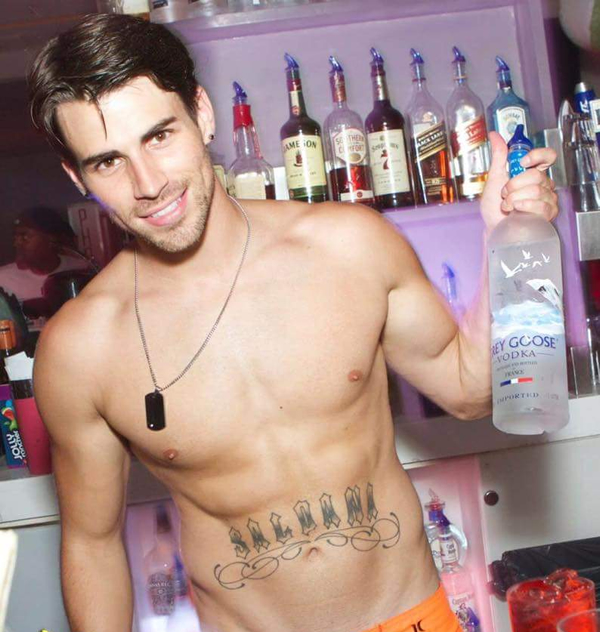
Anthony Saldana (Photo by Brett Saari Photography)
He prefers to be called a bartender rather than a mixologist, but Anthony Saldana is Micky’s top man behind the bar.
“We are more fine-tuned for speed and agility than mixing fancy drinks, because it’s always so busy,” Saldana told the Los Angeles Blade.
Born and raised in Ontario, in the inland empire, Saldana has lived in LA for the last 10 years, and worked at Micky’s for most of that time.
His first job after finishing UC Riverside was at Target as an executive manager. He says he was making $70,000 but on his first visit to Weho, a friend came running out of Micky’s with his shirt off, and told him they were hiring.
“I went in and spoke with the manager, who tore my shirt off in the office. He takes one look at me, and says I can start Monday. I told him about my Target gig and what I was making. He laughed at me and said I’d make double that,” he says.
Saldana waxes poetic about the days before the straight crowd discovered Weho.
He explains that straight guys come in to hit on drunk girls, but they don’t drink as much.
Trained using YouTube videos, this is the fourth year he’s won a Best Bartender title. In 2013, Grindr awarded him Best Bartender. He was flown to Vegas to receive the award.
“I don’t know why I keep winning, because I’m kind of an asshole,” he admits sheepishly. He adds, “If you come into my bar, and you act shitty I’m going to call you out on it. I’m very protective of my customers. I’ve jumped over the bar and thrown people out. I take shots with all of my customers. They literally love it.”
Saldana left home at 17 to “do his own thing.”
Now fairly distant from his family he says people don’t get to choose to be born into a family. “I want to choose who I love. I don’t want to be forced to love people I don’t even get along with. I travel a lot, and I take my friends wherever I go.”
His family found out about his being gay via social media. He almost married a girl. He has some complicated views on being gay, and says he gets pretty deep with customers about them all the time.
“I was born a straight man. I was in love with this female, it wasn’t until my sophomore year I had my first gay experience. I think as a child something very small could alter your thought process. I feel like the gay community always says ‘oh, you’re born gay,’ but if 10 percent of the community is born different than the other 90 percent, then that would make it a disability. I would hate to think that being gay is a disability. Personally I don’t want to be thought of as born gay… But, I’m gay now.
“I definitely appreciate a beautiful female though… and have this girl Natalie in my life that I call my wife. We’re inseparable and we do everything together, and I swear she would get married in a heartbeat, but sexually I just can’t do it. I associate with being gay,” Saldano says.
Single and dating, he has a staunch rule about never dating customers. He’s pressured a lot by men, and says he’s had to tell people he’s straight because it’s easier than telling men he’s not interested.
Despite turning a few guys away, Salgado gets gifts — lots of them. At Christmas he received a Cartier love band worth $10,000. “I mentioned that I’d always wanted one, and the next thing you know it’s getting screwed on my wrist,” he says. He’s been given a Mercedes, taken on trips, and even had someone give him money for his sick father.
“I mean people will give 10 to 20 percent to a church, whereas in the gay community they’ll give 20, 30 or 40 percent to the bars,” he says.
Although he’s known by the tattoo inked on his flat stomach, complete with washboard abs, the days of bartending shirtless are over.
A gym rat, Saldano says to keep his liver from completely failing, he only does shots of tequila, and his favorite is Don Julio anejo – always with a slice of orange. (REBEKAH SAGER)
MICKY’S
8857 Santa Monica Blvd.
310-657-1176
BEST BARTENDER, EDITORS’ CHOICE: CORY ZWIERZYNSKI
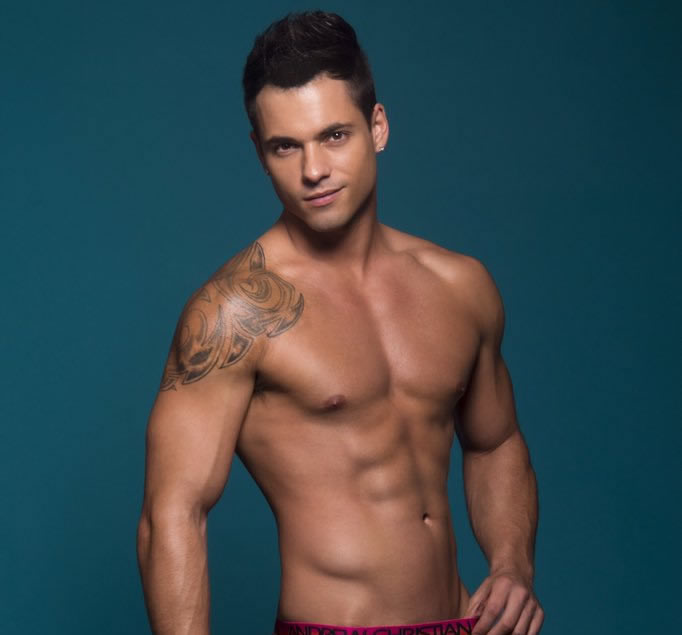
Cory Zwierzynski (Photo courtesy of Zwierzynski)
Bartender and star of “What Happens at The Abbey,” Cory Zwierzynski is the editors’ pick for Best Bartender. For nearly 25 years, The Abbey has dominated gay nightlife in West Hollywood. And Cory is almost as famous, thanks to his starring role on “What Happens at The Abbey.”
“When you start working at The Abbey,” Corey told the Los Angeles Blade, “it’s like joining a big family. We don’t just work together; we have a good time together. We have so many regulars at The Abbey that they are all part of the family too.”
Corey’s favorite moment at The Abbey so far? “People dancing to Diana Ross’ music on the dance floor with Diana Ross. It doesn’t get more memorable than that.”
THE ABBEY
692 N Robertson Blvd.
310-289-8410
BEST DJ: STEVE AOKI
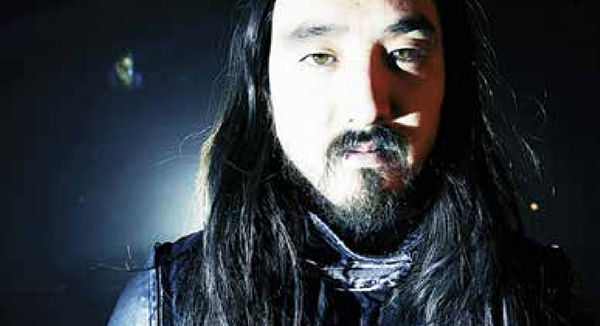
Steve Aoki (Photo courtesy of Aoki)
Steven Hiroyuki (Aoki) is one of the world’s most influential DJs. He certainly has the whole EDM circuit world jumping at venues around the world. But he’s really just an ordinary guy who grew up Newport Beach and attended USCB.
He holds degrees in feminist studies and sociology. But while in college, a spark captured his imagination when he produced a do-it-yourself record and began running underground concerts at Isla Vista, a section of residential land adjacent to UCSB. The venue became known as The Pickle Patch and it changed Aoki’s life.
In his early 20s, Aoki built his own record label, which he named Dim Mak – a reference to his childhood hero, Bruce Lee.
Aoki has won and been nominated for a number of industry awards, both in annual competitions and in magazine rankings. In 2007, he was named Best Party Rocker DJ by BPM Magazine, Best DJ of the Year by Paper Magazine, and Best Set of the Season at the Ibiza Awards. Several years later, in 2012, he was named #15 in the Top 100 DJs in DJ Magazine, and was named America’s #2 Best DJ. Also in 2012, he won an
EDM Effect Woodie Award by MTVu, and the following year he was nominated for his first Grammy.
In 2014, Aoki was awarded two Guinness World Records, one for the “longest crowd cheer,” and also for the “most amount of glow sticks for thirty seconds.” Aoki performed at the 2015 Ultra Music Festival in Miami Beach on May 21. He also earned the Guinness record for “most traveled musician in one year,” with 161 shows in 41 countries in 2014.
To say he has been successful is an understatement.
He is the founder of the Steve Aoki Charitable Fund, which raises money for global humanitarian relief organizations and medical research. In 2015, he was named Global Ambassador for the Best Buddies program, a non-profit devoted to young people with developmental and intellectual disabilities. Learn more at steveaoki.com
BEST DJ, EDITORS’ CHOICE: SHANE IVAN NASH
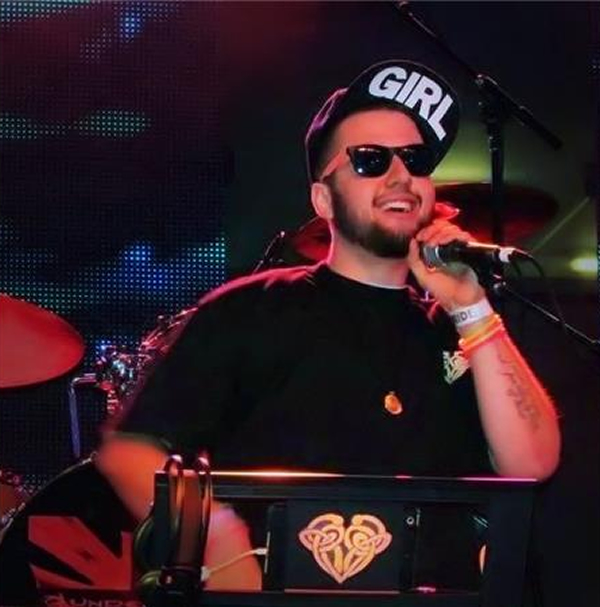
Shane Ivan Nash (Photo courtesy of Nash)
As a transgender activist and talented musician, Nash has consistently shared his story and his music, helping to inspire others. When asked what he loves most about DJing, Nash said, “Your profession requires you to party, dance and create a collected consciousness. The nightlife is the release from life—we’re all on the same beat, in the same moment.”
Of his work with the LGBT community, Nash said, “I’ve helped countless people in the community start their endeavors including Trans Chorus LA and as a board member for LA Pride, I fought for the trans representation.” Learn more at ShaneIvanNash.com.
BEST CHEF: STUART O’KEEFFE
If you haven’t heard of chef Stuart O’Keeffe, then you clearly haven’t been invited to the right A-list Hollywood dinner parties.
A small town Irish hottie, who now lives in West Hollywood, O’Keeffe made a name for himself on the Food Network’s “Private Chefs of Beverly Hills.”
“I was always obsessed with America and always wanted to be on TV,” O’Keeffe told the Los Angeles Blade.
His first gig in the U.S. after culinary school in Ireland was in Napa Valley working at Meadowood Napa Valley. But restaurants didn’t suit him. He says he didn’t like the way people were treated.
“I knew I was destined to do what I wanted without the stress. I thought there must be another way, and I kind of started doing dinner parties in my apartment for friends, and they’d tell people about them. I was also working as an executive assistant, and started getting hired for private parties.
O’Keeffe can’t talk a lot about who he works for, but will mention a few celebs he says have “eaten at his tables” – stars such as Sharon Stone, Jennifer Aniston, Justine Bateman, Harrison Ford, Cindy Crawford, Jane Fonda and Christina Aguilera.
O’Keeffe has been at his job long enough and has become well known enough that he doesn’t suffer fools and although his clients tend to be high-maintenance, he lives to cook for others.
“I want people to be nice. I’m not going to bow down to people. I’m well equipped to do this. I won’t stand for people being rude. I’m fair. I mean, how much do you value yourself really,” he says.
So, why do celebs keep calling him back? He says straight up, it’s the way he looks. “I’m a cute guy from Ireland. A lot of women, I overhear them asking if I’m straight or gay. It can be funny in a really sweet way,” O’Keeffe says laughing.
He’s currently single and dating. He likes to meet guys through friends or at a bar. He says his favorites are the Abbey, Revolver and Chapel. He meets people through friends mostly, and doesn’t do the app thing. He says he’s tried it, but it’s not personal enough and he’s too old school.
O’Keeffe says the “power gays” don’t hire him much.
“They have their set people they use… I think people think that I don’t do this anymore because I do so much TV, or because they think I’m above it. But, if I have time in my schedule, I’ll do it. I don’t really turn down things. I like to keep busy. I’d like to do more things,” O’Keeffe says.
His goal is to have his own TV show on the Food Network. He has another cookbook coming out later this year, and he wants to open a restaurant in the next year or two.
He envisions a show where he can travel around the U.S. — a kind of Irish guy fish out of water. He says he loves rural America, and thinks the people are funny and sweet. They remind him of the small town he grew up in — Nenagh, not far from Limerick.
He says Irish food is different than people think. “We have some of the best meat and fish in the world where we are,” he says.
His signature dishes are chicken cacciatore, short ribs, individual baked Alaska, and a killer flourless cake – “Jennifer Aniston told me my cake was good, so it must be badass.”
For a guy that makes his living off people who don’t cook for themselves, O’Keeffe believes a major problem with Americans in general is that they don’t cook at home enough.
“People need to get back in the kitchen and start cooking. There’s so much joy in that. And it’s healthier,” he says. He adds though that he actually hates to shop. “One of the most annoying thing about cooking is going to the store and shopping for the ingredients. I tell people to go shopping one day, and cook the next day. Cooking can be stressful if you don’t know how to do it.”
When O’Keeffe isn’t cooking for actors and Hollywood executives, you can find him on Mondays at the farmer’s market, on Gardner and Fountain streets, or at his local Whole Foods.
He lists Jar, Rossoblu, and Cecconi’s as his favorite restaurants in LA.
As for his TV aspirations that dream has certainly come true, if you count Food Network, “Stuart’s Kitchen” which aired in Ireland and New Zealand, appearances on Marie, CBS’s “The Talk,” “The Home and Family Show,” and Republic of Telly and Asiana Airlines featured Stuart in its national “Fly with Color” campaign.
EDITORS’ CHOICE, BEST CHEF: SUZANNE TRACT
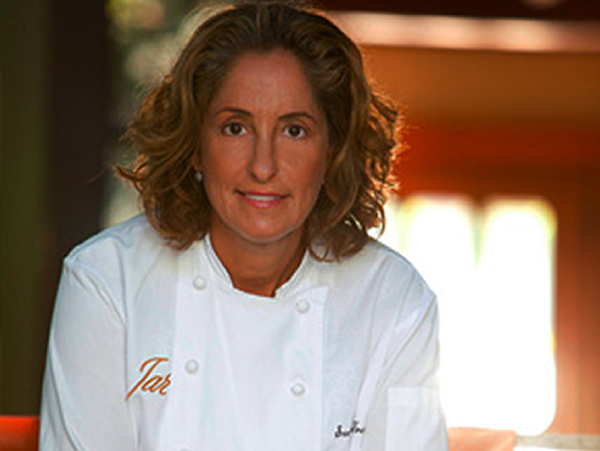
Suzanne Tracht (Photo courtesy Tracht)
Chef and owner of the critically acclaimed Jar Restaurant, Suzanne Tracht has won international praise for her culinary adventures at Jar. Her countless appearances on the “Today” show, Food Network, and Extra, as well as her multiple awards led her to be inducted into the Fine Dining Hall of Fame and participating in Fortune magazine’s Most Powerful Women Summit.
“Relating to people and making them feel warm and welcome isn’t hard and you can do it in many ways, which is why I cook,” Tracht said. “I like feeding people and making them happy.”
JAR
8225 Beverly Blvd.
323-655-6566
BEST BUSINESSPERSON: BRAD LAMM, BREATHE LIFE HEALING CENTER
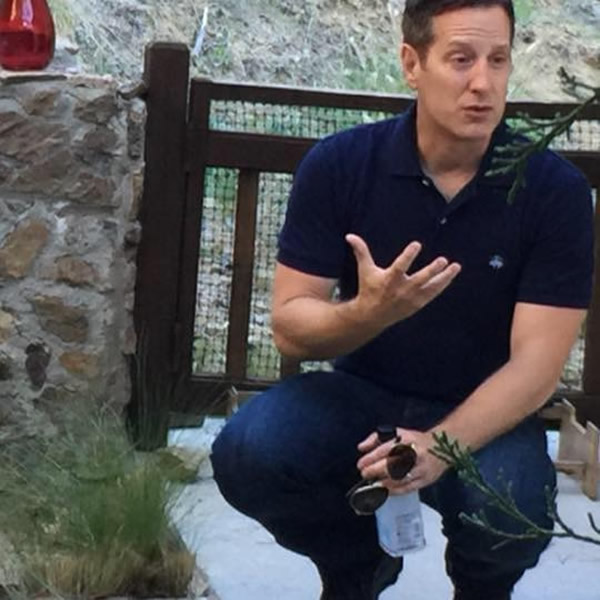
Brad Lamm (Photo courtesy of Lamm)
Fifteen years ago Brad Lamm was a self-proclaimed total mess. He was bulimic. He smoked two packs of cigarettes a day. He was an alcoholic, addicted to meth, and he supplemented all of this by taking Xanax. In 2002, he got clean.
Lamm’s journey to help others grew into an empire with two treatment centers that have helped numerous people in the LGBTQ community get clean and sober.
“I knew I was gay at 5 years old,” he says. “When I took my first drink at 15, I was deliciously soothed. By the time my first partner died in 1989, I was 19 years old and convinced not only was I going to die, but we were all going to die.”
He added, “We were part of this sad infected class with no upside… Gay men in my generation, pre-HIV cocktail, it was more than a death sentence, it was a shame sentence. It was a downward spiral. It was a grizzly and gruesome death. And I’d already been cast out of my family.”
ACT UP became Lamm’s upside. Although he was still getting high at the time, he fell into a clan he calls “purposeful,” working to make progress and trying to save his life.
“I found a place for my rage, but I thought I was going to die from alcohol and drugs, so when I didn’t, it was an amazing ‘ah-ha’ coupled with helping others, and it was all congruous with my trauma survival and being a gay man,” Lamm says.
It was in Lamm’s search for what to do with his life after getting clean that he found doctor Dr. Judith Landau, a South African psychiatrist focused on “invitational intervention,” a trauma-informed approach to helping families help their families.
“Essentially you invite your family to an intervention and the work starts from there. It suited me and it coincided with enormous energy I had around, never thinking I’d stop this litany of things that were killing me,” he says.
Lamm’s entre into the work Landau was doing eventually led to starting an intervention practice himself in New York, 13 years ago, and it really took off thanks to contacts he’d made in his former life as a TV weatherman.
“Some of the same skills I had as a journalist and some of the people I grew up in that industry with were now in TV running shows, and they knew about my remarkable turnaround.
“The ‘Today’ show said come and do a show on recovery, and Oprah said come and do a docu-series on food and that became “Addicted to Food,” an eight-part series produced for her. Then Dr. Oz said come help launch the show. And I did like 30 stories. That was the rocket fuel to this mission of helping my recovery community and their families reduce its suffering,” Lamm says.
Five years ago, Lamm opened a trauma-informed treatment center that would accept health insurance, Breathe Life Healing Center in Los Angeles.
“Meth and alcohol was my struggle, drug and hurt, so to see treatment in my community is powerful,” he says.
He and Scott Sanders, a Tony, Grammy and Emmy winning television, film and theater producer (Sanders produced the musical “The Color Purple” for Broadway), were married and it was the first gay wedding Oprah attended.
He says he sees so much of himself in the Celie character from “The Color Purple.”
“You’re at the end of the rope and you’re so beaten down, and then all of a sudden instead of cutting Mister’s throat, you choose grace and find your way. And part of that is forgiveness. But forgiveness doesn’t mean I need to live up to anyone’s version of who I need to be,” Lamm says.
Lamm says the headline of his life continues to be defined by something famed author, Alice Walker said to him 13 years ago.
“She told me that ‘the power of you is not your story, but that you’re a ‘bodhisattva.’ I was like, what’s that? She told me to go and look it up. It means, the one who goes into the lake of fire to help another out. That’s the beauty of every person to help another. The very wreckage of my past becomes the crown jewel of my ability to help another,” Lamm says.
BREATHE LIFE HEALING CENTER
8730 Sunset Blvd.
800-929-5904
EDITORS’ CHOICE, BEST LGBT BUSINESSPERSON: OLIVER ALPUCHE, REDLINE
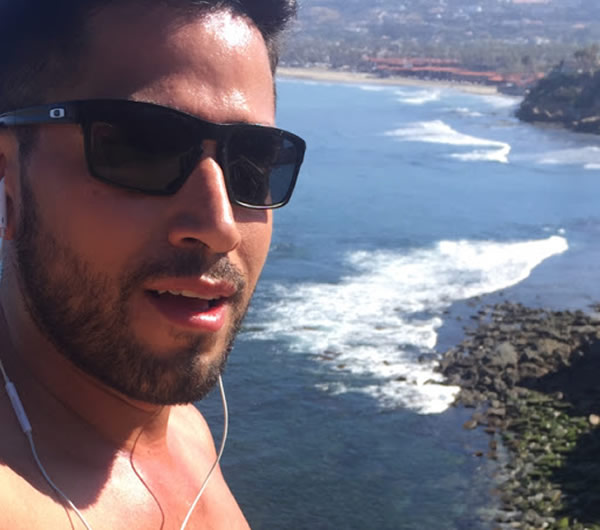
Oliver Alpuche (Photo courtesy of Alpuche)
When asked what inspired the business venture that led to the opening of this premier gay bar in DTLA, Oliver Alpuche said, “I’ve lived downtown for eight years and noticed that the LGBTQ community was growing, but we had nowhere to go and meet each other. Downtown deserves a dedicated queer space 365 days a year.”
That paved the way for the DTLA Proud Festival, which Oliver created. “DLTA Proud is committed to celebrating everyone’s story, to spreading optimism, to growing our community and to expanding our definition of diversity,” he said. “I love Los Angeles because of how diverse it is.”
REDLINE
131 E 6th St.
BEST LAWYER: S. CHRISTOPHER WINTER
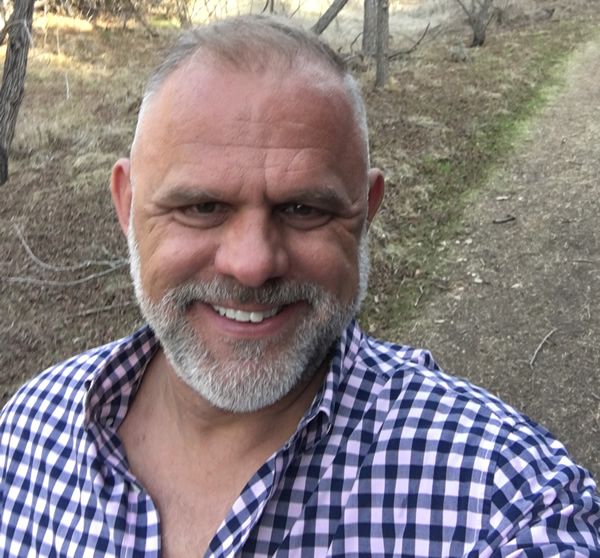
S. Christopher ‘Kit’ Winter (Photo courtesy of Winter)
S. Christopher (“Kit”) Winter didn’t always want to be a lawyer.
“I wasn’t one of those kids who had a clear idea of what I wanted to be when I grew up,” he said. “I could envision myself doing a lot of different things. It all seemed interesting.” That curiosity is reflected in his varied career in New York between graduating from Yale in 1987 and starting law school at UCLA in 1994. “I had a little bit of career ADD after college,” Winter said. “I worked in advertising sales, graphic design, desktop publishing – and I always had a side gig.”
Those side gigs included promoting parties at Limelight, Sound Factory and other New York nightclubs featuring DJs such as Frankie Knuckles, Little Louie Vega, and Junior Vasquez; bartending at various restaurants in the West Village and Chelsea; and working catering jobs for clients including Madonna.
“I think people were surprised when I decided to go to law school,” Winter laughs. “It wasn’t something that you would have necessarily thought was in my future.”
Surprising or not, Winter excelled at law school, graduating UCLA law in 1997 in the top 10 percent of his class and winning numerous academic honors. For more than two decades since then, Winter has been practicing law in Los Angeles, in settings ranging from large national law firms to his current solo practice.
“I don’t believe in fighting for the sake of fighting,” Winter says about his philosophy. “My goal as a lawyer is to help my clients navigate their legal challenges as quickly and affordably as possible.”
Winter’s practice is focused on serving as outside general counsel to small-to-medium sized companies, encouraging his clients to take a proactive approach to avoiding legal problems and crafting effective strategies to address problems. His legal background includes experience in litigation, intellectual property and general business law, and he has authored portions of treatises relating to privacy law and technology transactions.
Winter doesn’t specifically target his practice to the LGBT community, although he says he represents a diverse group of clients.
“I’m a ‘gay lawyer’ because I’m gay and I’m a lawyer,” he jokes. “I’ve been out of the closet since I was a teenager.”
Indeed, Winter has a long history of LGBT activism extending back more than 30 years. As an undergraduate at Yale, he was the co-chair of the Gay & Lesbian Co-op (with the late Sarah Pettit, a founding editor of OUT magazine), and part of a group of students who successfully lobbied the Yale Corporation to include “sexual orientation” in the university’s non-discrimination policy in 1986.
“I was sort of a big gay on campus,” Winter recalls, “writing op-eds in the Yale Daily News, arranging protests, that kind of thing.” Asked whether he contributed to the environment that led the Wall Street Journal to label Yale the “Gay Ivy” in 1987, Winter laughs, “I’d like to think so. I definitely left Yale a gayer place than I found it.”
Winter moved to New York City in 1987, in the middle of the AIDS crisis and shortly after the founding of ACT UP. “It was a terrifying time,” Winter says. “While my straight friends from college were starting their careers or heading to graduate school, gay men were trying to survive an apocalypse.”
Winter became involved in ACT UP and found a home in gay publishing, working first at the New York Native, New York’s gay newspaper, and later serving as the founding advertising director of Outweek magazine.
He later served as the production manager of QW, a gay newsweekly (Troy Masters, Los Angeles Blade publisher was a founder and publisher of QW) for which he also briefly penned the advice column under the moniker “Queer Abby.” “I don’t think we thought much about trademark law back then,” Winter laughs. After working as a freelance desktop publisher at various Conde Nast titles including Mademoiselle, Allure, and Details, Winter decided to pursue the challenge of a career in law, and hasn’t looked back since.
“I love being a lawyer,” Winter says. “Legal issues can be overwhelming to people, and can be fatal to businesses. Helping my clients get through that successfully is very rewarding.”
Winter is married to Patrick Jensen, a Licensed Marriage and Family Therapist. They live in Silver Lake and have two dogs and two cats.
This year will mark Winter’s fourth time riding in AIDS/Lifecycle to raise money for the Los Angeles LGBT Center.
EDITORS’ CHOICE, BEST LAWYER: LAURA W. BRILL, KENDALL BRILL & KELLY LLP
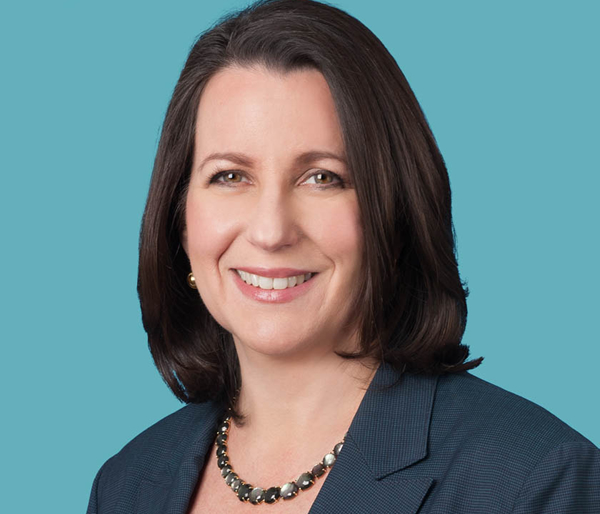
Laura W. Brill (Photo courtesy of Brill)
A lifetime focus on cases that promote equal rights, make Laura Brill a force in the fight against discrimination.
“One of my briefs in the early 1990s argued in the case of Lawrence v. Texas (a challenge to a state anti-sodomy statute) that discrimination based on sexual orientation was a type of sex discrimination and that the statute should be ruled unconstitutional on that basis. That same argument has been made many times over the years…this theory is now gaining recognition by courts and administrative agencies, including most prominently, in cases relating to employment discrimination.”
In the case Colin v. Orange Unified School District, Brill helped pave the way for Gay Straight Alliances. Brill discussed this significant moment: “We got the first preliminary injunction requiring the school to allow the club to meet and use school facilities just like any other club. One of my favorite moments since then has been going to gay Pride events more recently and seeing the huge numbers of wonderful high school students marching with their Gay Straight Alliance banners. I’m so happy to have had a part in helping kids have a safe environment at schools.”
“My New Year’s resolution is to do all I can to increase voter registration rates, especially among young people and especially in the LGBTQ community. Many people don’t know that young people can pre-register to vote when they are 16 or 17. Then when they turn 18 they will be automatically registered to vote,” Brill said. “Most people don’t know about pre-registration, but we need everyone registered so we can make sure government policies reflect our priorities, instead of the opposite.”
Kendall Brill & Kelly LLP
10100 Santa Monica Blvd
310-556-2700
BEST ALLY: MAYOR ERIC GARCETTI
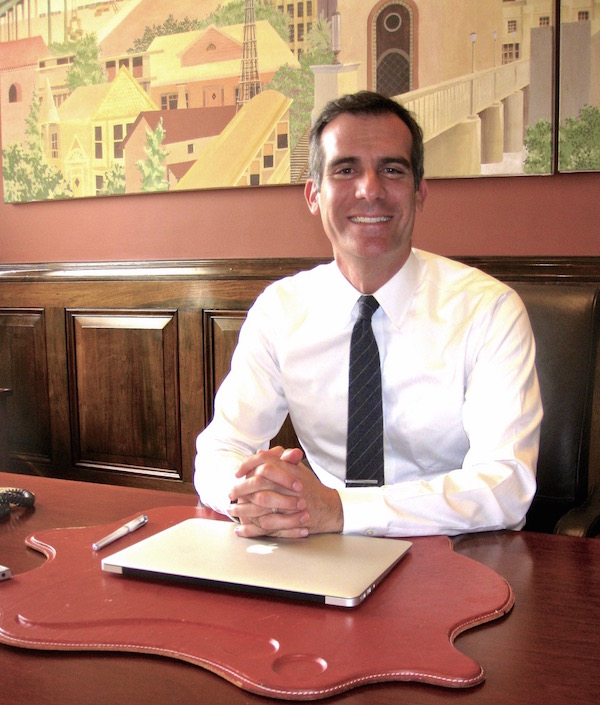
LA Mayor Eric Garcetti in his office (Photo by Karen Ocamb)
EDITORS’ CHOICE, BEST ALLY: LISA VANDERPUMP
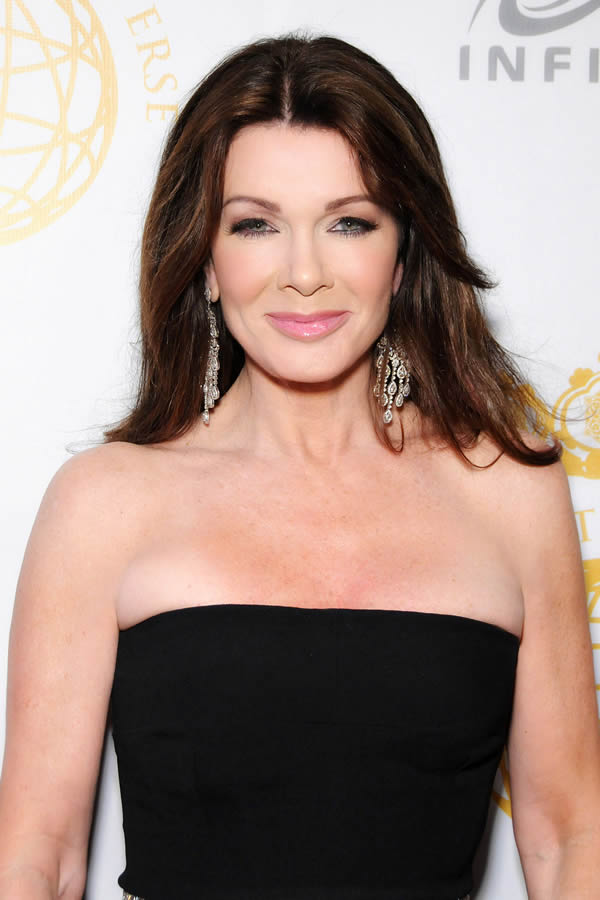
Lisa Vanderpump (Photo by Toglenn; courtesy Wikimedia Commons)
As an entrepreneur, avid activist, author, television personality, and restaurant owner of LA staples such as Pump and SUR, Lisa Vanderpump is an LA icon. She has consistently stood up for the LGBT community, having worked as a spokesperson for GLAAD, led the AIDS Walk Los Angeles, served as grand marshal of 2017 Long Beach Pride, worked with Desert AIDS Project, The Trevor Project, the LA Gay & Lesbian Center and more.
In addition to advocating for the LGBT community, Vanderpump created The Vanderpump Dog Foundation, working to help end animal abuse. She somehow also found time to produce “Vanderpump Rules,” the smash reality TV show. She’s the ultimate philanthropist who really does it all. Vanderpump has a love for all living creatures that shines through in her humanitarian efforts, making her a model ally.
BEST DRAG SHOW: LEGENDARY BINGO AT HAMBURGER MARY’S
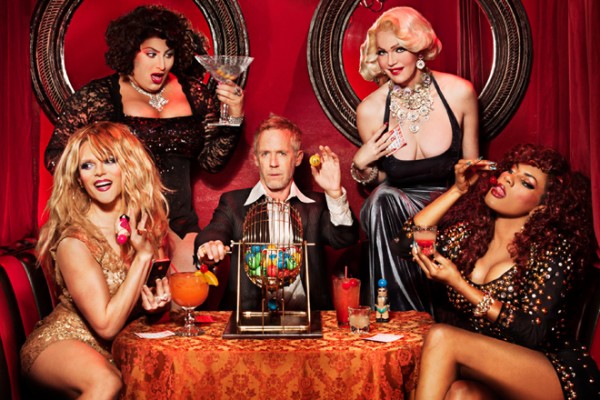
Jeffery Bowman and cast members from Legendary Bingo. (Courtesy Legendary Bingo)
Beautiful drag queens, fantastic food, money, charities…Bingo! Legendary Bingo at Hamburger Mary’s is not just a great drag show, it’s a fantastic and sometimes wild night out. Jeffery Bowman is almost as legendary as Hamburger Mary’s.
HAMBURGER MARY’S
8288 Santa Monica Blvd
323-654-3800
EDITORS’ CHOICE, BEST DRAG SHOW: LYRIC HYPERION, GREEN EGGS AND GLAM
Lyric Hyperion Theatre & Café
2106 Hyperion Ave.
323-928 2299
BEST BAR: THE ABBEY
Where else are you going to see Diana Ross or Elon Musk tear up the dance floor? The Abbey is arguably the best-known gay bar in all of the U.S. and always a fun night out with your besties. It’s a treasured LA icon and so is owner David Cooley.
THE ABBEY
692 N. Robertson Blvd.
310-289 8410
EDITORS’ CHOICE, BEST BAR: REVOLVER
WeHo loves the oversized drinks and darts in the back at this famous video bar.
REVOLVER
8851 Santa Monica Blvd.
310-694 0430
BEST RESTAURANT: SUR RESTAURANT AND LOUNGE
“Real Housewives” star Lisa Vanderpump’s SUR is a great place for people watching, and the upscale food is, well, impressive. It’s definitely a see-and-be-seen scene that can’t be missed.
SUR
606 N. Robertson Blvd.
310-289 2824
EDITORS’ CHOICE, BEST RESTAURANT: Cecconi’s West Hollywood
The Northern Italian cuisine is spectacular, the decor a kind of elegant retro Roman-chic with outdoor seating. True luxe.
CECCONI’S
8764 Melrose Ave.
310-432 2000
BEST GROCERY STORE: TRADER JOE’S
Quite simply, the best place to go shopping for unique, curated food brands.
TRADER JOE’S
7310 Santa Monica Blvd.
323-969-8048
EDITORS’ CHOICE, BEST GROCERY STORE: PAVILIONS
Extensive selections of the highest-quality foods. And, at least in WeHo, it’s where the boys are.
PAVILIONS
8969 Santa Monica Blvd.
310-595-1730
BEST REAL ESTATE AGENCY: THE COLLECTIVE REALTY
Experienced real estate agents who negotiate well for their clients. One reader said, “The Collective is the concierge service of boutique realty. And Andy Vulin is the best real estate investment teacher I ever met.”
EDITORS’ CHOICE, BEST REAL ESTATE AGENCY: BERKSHIRE HATHAWAY
Find the most luxurious West Hollywood or Beverly Hills home of your dreams and call Berkshire Hathaway, because no one can close it faster or more fairly. Readers praised their attentiveness to detail.
BERKSHIRE HATHAWAY
131 S. Rodeo Dr.
310-844-6434
BEST STYLISTS: SHORTY’S BARBER SHOP
Whatever level of service you require for your coif, Shorty’s is the place to go. It’s the very best place in West Hollywood for a drop in fade. People travel from all over Los Angeles to the unmistakable storefront on Fairfax.
SHORTY’S
755 N. Fairfax Ave.
323-297-0554
EDITORS’ CHOICE, BEST STYLIST: MARCO PELUSI
Celebrity hairstylist Marco Pelusi has the best tips for looking great. “Ask your stylist to do a gloss or a shine treatment when you’re next at the salon,” he recommended. “Your hair can often dry out and look dull, lifeless, and frizzy during winter months; the added shine treatment will boost the condition of your hair and make it look healthy.”
MARCO PELUSI
636 N. Robertson Blvd.
310-967-0999
BEST CAR DEALERSHIP: BEVERLY HILLS BMW
One reader commented, “At Beverly Hills BMW, I walked through and decided what I wanted and with no pressure at all I left with the $90,000 ride of my dreams. No hassles, no pressure. Just great service and a brilliant ride.”
BEVERLY HILLS BMW
5070 Wilshire Blvd.
877-794-4678
EDITORS’ CHOICE, BEST CAR DEALERSHIP: HONDA OF HOLLYWOOD
Honda of Hollywood has one of the best full-service shops of any dealership in Los Angeles. Our favorites are the 2018 CRVs and HRV. Great quality SUVs at a realistic price.
HONDA OF HOLLYWOOD
6511 Santa Monica Blvd.
323-466-3247
BEST MEDICAL PROVIDER: CEDARS SINAI URGENT CARE
World-class urgent care from one of the world’s leading medical institutions.
EDITORS’ CHOICE, BEST MEDICAL PROVIDER: SOUTHERN CALIFORNIA MEN’S MEDICAL GROUP
Doctors you can talk to and advice that’s easy to take because they are just like you. Comprehensive, fully loaded and state of the art.
SOUTHERN CALIFORNIA MEN’S MEDICAL GROUP
9201 Sunset Blvd.
310-550-1010
BEST FITNESS FACILITY: 24 HOUR FITNESS
One of the busiest places in WeHo, 24 Hour Fitness is as much a family for some as it is a gym.
24 HOUR FITNESS
8612 Santa Monica Blvd.
310-652-7440
EDITORS’ CHOICE, BEST FITNESS: EQUINOX FITNESS
A little bit of luxury goes a long way during a hard workout. Outstanding, modern and clean facilities are what make Equinox worthy of Editors’ Choice.
EQUINOX FITNESS
8590 Sunset Blvd.
310-289-1900
BEST MARIJUANA DISPENSARY: MEDMEN
Since Jan. 1, MedMen has experienced lines down the block and its fans are true believers in the almost Apple Store experience of boutique weed products of every kind. Founder Andrew Modin, almost overnight, has become a business sensation in West Hollywood and is now ramping up to take it national.
MEDMEN
8208 Santa Monica Blvd.
323-848-7981
EDITORS’ CHOICE, BEST DISPENSARY: ZEN HEALING WEST HOLLYWOOD
Some say it has one of the highest-grade selections of any store in Los Angeles. Its edibles and medicinal choices are outstanding.
ZEN HEALING
8464 Santa Monica Blvd.
323-656-6666
BEST HOTEL: WALDORF-ASTORIA
One of the world’s leading hotel names is now at home along Santa Monica and Wilshire Boulevard in Beverly Hills. Unprecedented luxury is just the tip of the iceberg of the Waldorf experience. After watching it soar skyward during construction, you know you want to spend the weekend there. Staycation!
WALDORF-ASTORIA
9850 Wilshire Blvd.
310-860-6666
EDITORS’ CHOICE, BEST HOTEL: JEREMY HOTEL
Soon to experience a name change — think One Hotel — The Jeremy, as everyone now calls it, is an astounding architectural gem and gorgeous hotel overlooking Rainbow City. It’s not only a great place to stay, it’s also a destination.
JEREMY HOTEL
8490 Sunset Blvd.
310-424-1600
BEST HOUSE OF WORSHIP: FOUNDERS METROPOLITAN COMMUNITY CHURCH
The house that MCC founder Troy Perry built is a rollicking, down home gospel of faith and a beacon in the fight and one of the most consequential cornerstone establishments of LGBT history in LA.
FOUNDERS
4607 Prospect Ave.
323-669-3434
EDITORS’ CHOICE, BEST HOUSE OF WORSHIP: KOL AMI
One of the most significant Reform synagogues in America is also one of the most innovative. A powerhouse of Jewish tradition and thought, Rabbi Denise Eger is devoted to community and social justice.
KOL AMI
1200 N. La Brea Ave.
323-606-0996
BEST LGBT SOCIAL GROUP: IMPULSE GROUP LA
Impulse Group is an international group that advocates change toward healthier sexual lifestyles among gay men in 18 cities around the world, based in Los Angeles. Founder Jose Ramos felt stronger community bonds and family building among peers can reduce HIV rates and save lives. Turns out he was right.
EDITORS’ CHOICE: BEST LGBT SOCIAL GROUP: VARSITY GAY LEAGUE
California’s largest LGBT recreational sports league is celebrating 10 gay years! A robust and well-organized calendar of Kickball, Dodgeball, Bowling, Tennis, Soccer and Volleyball. Who says gays don’t do sports? Will Hackner and Andrew Miller want to know.
BEST MUSEUM: LOS ANGELES COUNTY MUSEUM OF ART
LACMA is a world-class museum and with its expansion, including an incorporation of Hollywood movie and Oscar history, it’s unrivaled. Many outstanding collections and community events, like outdoor films, make it a treasured institution.
LACMA
5905 Wilshire Blvd.
323-857-6000
EDITORS’ CHOICE, BEST MUSEUM: THE BROAD
One of the most important modern museums in the western United States is also one of the most iconic landmarks in DTLA. Eli Broad’s massively important contemporary art collection almost wound up in a building that would have been where the new Waldorf is today.
THE BROAD
221 S. Grand Ave.
213-232-6200
BEST NON-PROFIT: AIDS HEALTHCARE FOUNDATION
AHF provides services to more than 600,000 HIV+ individuals in 15 U.S. states and 36 countries worldwide and is the largest AIDS service organization in the world. Michael Weinstein founded the agency as a hospice when no hospital would care for AIDS patients and since then has grown it into a billion-dollar non-profit.
AIDS HEALTHCARE FOUNDATION
6255 W. Sunset Blvd.
323-860-5200
EDITORS’ CHOICE, BEST NON-PROFIT: LOS ANGELES LESBIAN & GAY CENTER
Founded by Morris Kight in 1969, LA’s LGBT Center is now the world’s largest LGBT social service agency and community center and is in the middle of an expansion that will revolutionize its reach. Lori Jean, its CEO, has become one of the most important LGBT non-profit leaders in the U.S.
LGBT CENTER
1625 N. Schrader Blvd.
323-993-7400
BEST VET: LAUREL PET HOSPITAL
A truly empathic provider of outstanding medical services for generations of LGBT community members in West Hollywood.
LAUREL PET HOSPITAL
7970 Santa Monica Blvd.
323-654-7060
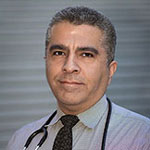
Dr. Mark Nunez
EDITORS’ CHOICE, BEST VET: Dr. MARK NUNEZ, formerly of VETERINARY CARE CENTER, now Medical Director of VCA Miller-Robertson Animal Hospital.
Dr. Mark Nunez was previously Veterinary Care Center’s go-to doctor, known for going the extra mile to save your pet. Dr. Nunez recently accepted a new position as Medical Director of VCA Miller-Robertson Animal Hospital
VCA Miller-Robertson Animal Hospital
8807 Melrose Ave, Los Angeles, CA 90069
310-657-7050.
BEST LA ATTRACTION: GRIFFITH OBSERVATORY
The go-to place for all family visits and the south-facing slope of Mount Hollywood offers views that just can’t be beat.
GRIFFITH OBSERVATORY
2800 E. Observatory Rd.
213-473-0800
EDITORS’ CHOICE, BEST LA ATTRACTION: HOLLYWOOD BOWL
The iconic outdoor theater celebrates everything about Los Angeles and features some of the greatest names in music, under the stars.
HOLLYWOOD BOWL
2301 N. Highland Ave.
323-850-2000
BEST RED CARPET EVENT: HRC LA DINNER
The Human Rights Campaign brings out the star power each year in Los Angeles and is famous for an exuberant red carpet experience. On March 10, 2018 you have your next chance to take a walk.
EDITORS’ CHOICE, BEST RED CARPET: OUTFEST
The world’s most important LGBT film festival is also becoming one of LA’s most anticipated events.
(Mary Jo De Silva contributed to this article)
a&e features
Over a dozen renowned queer poets, authors to come together for literary event
Precinct DTLA will host free event celebrating poetry

During a time when members of politics seem hell-bent on keeping queer voices silenced, Los Angles continues to be home to a thriving, queer community of poets. On March 28th at 5 pm, 19 renowned LGBTQ+ poets and authors from across the country will be tongue tied at Precinct in Downtown Los Angeles for a free poetry event titled ‘Tongue Tied.’
This group of writers will be reading their queerest work while shibari bondage artist Jupiter will create rope ties on the poets while they perform. The night asks: what does it mean to create under restraint?
The mastermind behind Poetry Unbound is Brian Sonia-Wallace, a leading figure in the literary world with published work and who also served as the 4th Poet Laureate of West Hollywood. He is also a performance artist who has written poetry for strangers in the most unconventional of ways. We talked with Sonia-Wallace about his career, the literary community in L.A and what to expect from the event.
What was your first exposure to poetry, and what attracted you to get into that literary genre?
I was a fantasy nerd growing up and loved the songs and spells in Tolkien, CS Lewis, Ursula Le Guin, and Susan Cooper. The idea that you could invent a world with words — and new languages to inhabit that world — blew my little gay mind. Wizards always need a magic word.
This has, I think, affected my view of poetry in the world. I have, well, an academic interest in poetry’s history and structure, but I’m more curious about how pure language can short-circuit our ability to feel. People use poetry — at weddings, at funerals, on anniversaries. I think the goal of all artists is to say the ‘unsayable’ and in that little piece of magic make it suddenly sayable by anyone. Poetry feels to me like the most pure way to do this.
How does your queerness add to your poetry?
I think queer people are natural poets — we’re masters of the ‘unsayable.’ We’ve all had long conversations with ourselves before deciding whether or not to let anyone in.
As a type of performance art meets poetry, you have literally written poetry for strangers on the street. What is your mission with this type of writing?
Capitalism, baby! Honestly, this is how I accidentally started my business (we do lots of everything from weddings to corporate events to museums now with poets at typewriters).
But getting a little deeper, let me share this passage from my book:
“It seems to me that most people just need their stories to be heard. And that need is the right word. That we lose something when our stories are not heard. That something not only in us, but in the world, dies.
With every poem I write, I remember that the value of a story doesn’t depend on how many likes or retweets it gets, or how many people it reaches.
Sometimes, just one person hearing a story — is enough.”
-The Poetry of Strangers
Does any particular stranger you wrote for stick out in your memory?
So we did an event this week for Sketchers (thanks for the shoes, Sketchers!) where I got to write for various shoe executives from around the country. Almost all the women wanted poems about their kids, toddlers or young adults, on whom these mothers had spent so many thankless hours. About half of them cried, hearing their stories reflected back – having them witnessed. How often is that love and labor seen and acknowledged?
Likewise, one young man spent 15 minutes just pouring out his gratitude for his mom. She was his biggest cheerleader growing up, and when he packed up to move for this job a quilt she made him was the first thing he packed and unpacked. Who else can a man gush to about his mom?
Finally, an older man, from the South, white-haired, almost-military-bearing. Traditional, you understand. Who knows how he voted? I didn’t ask. He wanted a poem for his mom. The first thing he told me was that she was an alcoholic, but had been sober 30+ years, ever since his daughter was born and he’d given her an ultimatum: booze or the grandkid. The grandkid won. And now grandma was dying of cancer, he felt guilty his wife was taking care of her back home. His mom could always laugh at herself, he told me. He remembered when he was six her running down the sidelines with him all the way to a touchdown in a peewee football game.
After I read him his poem, he hugged me so hard the event photographer practically jumped on top of us and started snapping photos, eager to capture the emotion.
It’s become cliche to talk about the crisis of masculinity in the US. What these experiences show me is that there’s a vulnerability and even an eagerness to engage with it, but we’re not always helping people find the tools. Therapy is one. But so’s poetry. So’s bowling. You know. Being with people. Seeing and being seen.
You also served as the fourth West Hollywood City Poet Laureate for a number of years. What was your biggest accomplishment or best memory from serving in that position?
The Laureateship taught me so much and really helped me feel like I could and should speak about and with our community. I think I’m most proud of helping re-start the APLA Health Writers’ Group for older adults living with HIV, which has existed since 1989 but was defunct until we relaunched it on Zoom during the COVID lockdowns. That, or the poetry walk on Santa Monica Blvd on the median strip west of The Abbey, check it out!
One of my goals is always to bring poetry to unlikely places, and where better to start in WeHo than the gay bars on the Santa Monica Blvd strip? We started an open mic at Micky’s and now are at The Wild (check out our UnBound series, March 19 is the next one!) — it’s been a joy running an event that focuses on people’s voices and stories in places that are often purely physical, and creating a platform for hundreds of artists in our community.
Tongue Tied — what is the correlation between poetry and shibari?
When Jupiter first tied me up I knew I had to get him for a poetry show. The work he does with shibari, the exploration of discomfort and trust, felt weirdly similar to what I do, emotionally, at the typewriter. It’s about a moment of intentionality and slowing down that has the potential to be transformational.
That said, I’m also a theater person and get bored at poetry readings. I need visuals! Cue: watching poets get tied up. I love the juxtaposition, the reminder that these minds are also bodies, and the challenge to the poets to not just come do their usual schtick but to have a genuine, first-time moment with their work and with all of us.
You have quite an impressive group of poets for this event, how did you gather them all together?
Gosh, some great people said yes, didn’t they? These queens have Pulitzers and professorships. I’ve attended the AWP Conference for three years now, and built relationships through that time — but I’ve also just been a fan and asked! There’s nothing like when your idol says they’ll do your show.
What do you want the audience to walk away with the most from experiencing Tongue Tied?
I hope they leave tongue-tied! Ok, ok, I couldn’t resist. I hope folks will go away having seen something they’ve never seen before and will never see again, that they find their new favorite artist, befriend their idol, and, if they’ve never written a poem before, promptly go and do so.
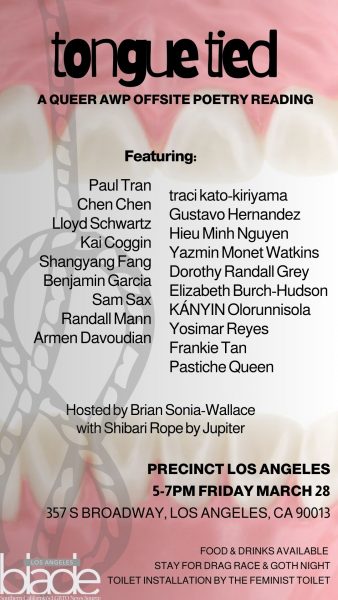
Tell us about the thriving queer poetry community in Los Angeles.
LA is one of those cities where I’m constantly finding out about new events and pockets I’d never heard of. The Nonfiction Show at Nico’s Wines in Glendale? So cool! Empty Trash (formerly at The Ruby Fruit)? How do they get these writers?! Act 3 Open Mic in DTLA (@act3openmic)? So many queer rappers practicing their craft.
And that’s not counting the bookstores. I don’t know if you’ve been following the news, but reading is gay now. Always has been.
What are the biggest challenges facing a queer poet in today’s social and political climate?
It’s a sign of my middling success in the literary world that none of my books has been banned yet, and I’ve been known to talk about trans witches and pups getting fisted, so go figure. But we know about book banning.
I think the thing we’ll be seeing coming up is a shift in our language. Queer folks have always developed their own language to pass undetected (think Polari) and now as we’re seeing the widespread destruction of funding and even mention of anything BTQ+ and even LG, I’m thinking with some smart people about how to shore up support at the local level and lie convincingly, in a way that lets only friend in, at the national level.
It’s bleak, but we’ve always found each other. Always will.
What else can we look forward to from your group this year?
Pride Poets will be at the WeHo/LGBT Center’s Pride Arts Festival, and partnering with Beverly Hills to help with their 4th ever Pride celebration — and look out for some poetics at World Pride in DC as well! I have a commission out there premiering that week at a certain highly reputable institution with a new cheeto-haired chairman, if I don’t blow it by being too gay first.
What is your message to the queer community?
Be gay, do crime.
Always gotta lead with that. But really: find your people, trust your people are out there, and don’t be afraid of anyone, especially yourself.
Event Details:
Location: Precinct, 357 S Broadway, Los Angeles, CA 90013
Date & Time: Friday March 28, 5-7 pm
Free Admission
The featured poets include Pulitzer Prize winners, Poets Laureate, professors, activists, and published authors: Paul Tran, Chen Chen, Lloyd Schwartz, Kai Coggin, Shangyang Fang, Benjamin Garcia, Sam Sax, Randall Mann, Armen Davoudian, Gustavo Hernandez, Hieu Minh Nguyen, Yazmin Monet Watkins, Dorothy Randall Grey, Elizabeth Burch-Hudson, KÁNYIN Olorunnisola, Yosimar Reyes, Frankie Tan, and Pastiche Queen.
a&e features
Interview with Actor D.K. Uzoukwu shines light on new role
Uzoukwu chatted about his family, career, self-discovery journey and joining the Norman Lear legacy

Uzoukwu is enjoying his time in the spotlight, holding his own alongside Laverne Cox and comedy great, George Wallace in Norman Lear’s last comedy. Clean Slate centers on Desiree (Cox), a proud trans woman who is finding her footing in life as she returns to her small hometown and tries to re-build a relationship with her father (Wallace) as his now-daughter.
The show is a comedy with many touching moments and comes at a time when trans representation is so needed. Uzoukwu shines as Desiree’s best friend Louis a closeted gay man who serves as the local church’s choir director. Together the two find their way.
Uzoukwu is also a 2021 Acting Fellow of the Hillman Grad Mentorship Program, led by Lena Waithe. He is also a writer and co-wrote two seasons of Issa Rae’s audio drama “Fruit,” and has been Reader-Endorsed on The Black List for his award-winning spec pilot “Kinfolk.”
We chatted with Uzoukwu about his family, career, self-discovery journey and joining the Norman Lear legacy.
He credits a strong family foundation for teaching him the tools for life as a proud son of immigrant parents.
“I was raised first generation by very proud Nigerian parents, who definitely had their sights set on me being a doctor or a pharmacist. Those are very stable jobs, especially in a country that doesn’t really give you a lot of breaks as an immigrant, even more. They just wanted something that was stable for me. My parents have shown me just what it takes to live in this country as an immigrant. The tenacity, the persistence, the strive to be better. They instilled all of those attributes in me.”
Despite Uzoukwu’s parents wanting him to work in a stable profession, they came to support his dream to become an actor. He ended up graduating cum laude from Temple University, with a Bachelors in Film and Theatre.
“They chose to support my dreams instead of admonishing me for them and it takes a very open and honest heart to say, ‘I want my child to be the best they can be in whatever they choose to do in this life, because it’s their life and not mine.’ That isn’t always easy for parents, but especially more so for immigrant parents, especially Nigerian parents, that’s just something that we did not grow up with. So beyond the tenacity and the perseverance, they also taught me unconditional love and support and those are attributes that I carry with me to this day. They were with me at the [Clean Slate] premier and it was just great to have my father and mom there by my side. It’s a dream come true.”
In typical Norman Lear style, Clean Slate pushes the envelope and makes current hot topics part of the norm. The show deals with trans and queer community narratives, deals with self-acceptance in the face of bigotry, faith v. religion struggles and questions what exactly a family looks like in today’s age. The show, which focuses on a Black family, is part of the current boom in queer storylines in minority-driven programming.
Uzoukwu explains the increase in representation:
“I just think we are more aware of what’s out there. We have so much more access to other people’s lives at our fingertips. Social media has been a very huge plus in that respect. In a way, it has normalized the idea of having queer people in our lives. We always have, we just weren’t allowed to really be public about it. But now it is normalized and hopefully even more so going forward. I think there is a little bit of a pushback. People talk about a pendulum swing right now, but I think that it forces us to be even more brave and adamant about staking our place in society. We have a right to be here. We all have a right to exist and pursue lives of love and freedom, our God-given rights. I think the more we press forward and continue to live our lives, the more that presence and existence will be seen in our media because we are what we see.”
Uzoukwu nailed his audition for Clean Slate. Reading the sides, he resonated at once with the character of Louis. He sent in his audition tape – which also required singing and two and a half weeks later – he did his screen test. Then BOOM, it was booked. As a queer actor, did Uzoukwu have any trepidation about taking this role for fear of being pigeon-holed?
“There’s always going to be fears about only being seen as one thing. I’m not going to lie, I did kind of have that fear. But I get that anytime I do a bigger project that kind of feels like something that could establish me as a performer in other people’s eyes. You watch a great performance of somebody and you’re like, wow, I could only see them as that. That is something that happens a lot. So there’s always that fear, but I don’t know if it’s something that I necessarily have to worry about. My team is very aware of my talent and what I can do, so my goal is to just go out and try to play as many parts as I can. I just want to keep looking forward and see what else is next, hopefully a season two. Fingers crossed!”
With Norman Lear’s recent passing, being part of the legacy that created All in the Family, One Day at a Time, Maude, The Jeffersons, and so many others, is an actor’s dream. Especially for someone as young as Uzoukwu.
“I definitely still have to pinch myself sometimes when I think about that aspect. I never really saw myself being a comedy actor when I first started out. I thought I was just so much better at drama. So for me to land my first big role in a comedy is kind of like, ‘Oh, you thought you knew what you were about? You thought you knew what you could do, but God had a different story for you.’ You just don’t know what the world, what life will bring. So to be a part of a comedy like this, but also one that is connected to that legacy is a huge deal.
I definitely don’t take it for granted. It means the world to me. When we talked about the show and sort of leading the charge on telling stories of other people and how we can all coexist, he was that person for generations. To be a part of his last comedy is truly a gift. You never could have had me predict that for my future.”
Uzoukwu hopes his personal journey serves as an example for other actors. His message to the community is also his message to himself.
“I spent a lot of time trying to figure out what kind of person I wanted to be in this industry, whether or not I was going to be comfortable enough to come out and be an out gay actor in Hollywood. I didn’t know if it was the smart choice or the right choice.
I realized that in order for me to really tell the stories the way they needed to be told, I had to commit to an identity for myself. I had to choose to be comfortable with myself. That’s something I hope future generations don’t have to sort of battle with or try to figure out for themselves that they can just be and that’s okay. It wasn’t always the case. I am glad that I took this circuitous journey to choose myself. I hope that the community continues to choose themselves and that they don’t feel that they have to decide between safety and freedom, that we can have both. Because we deserve both.”
Clean Slate is now streaming on Prime.
a&e features
Pose’s Dyllón Burnside takes on most ambitious role yet in latest film
In this Blade exclusive, actor Dyllón Burnside gives us a candid look at his latest role
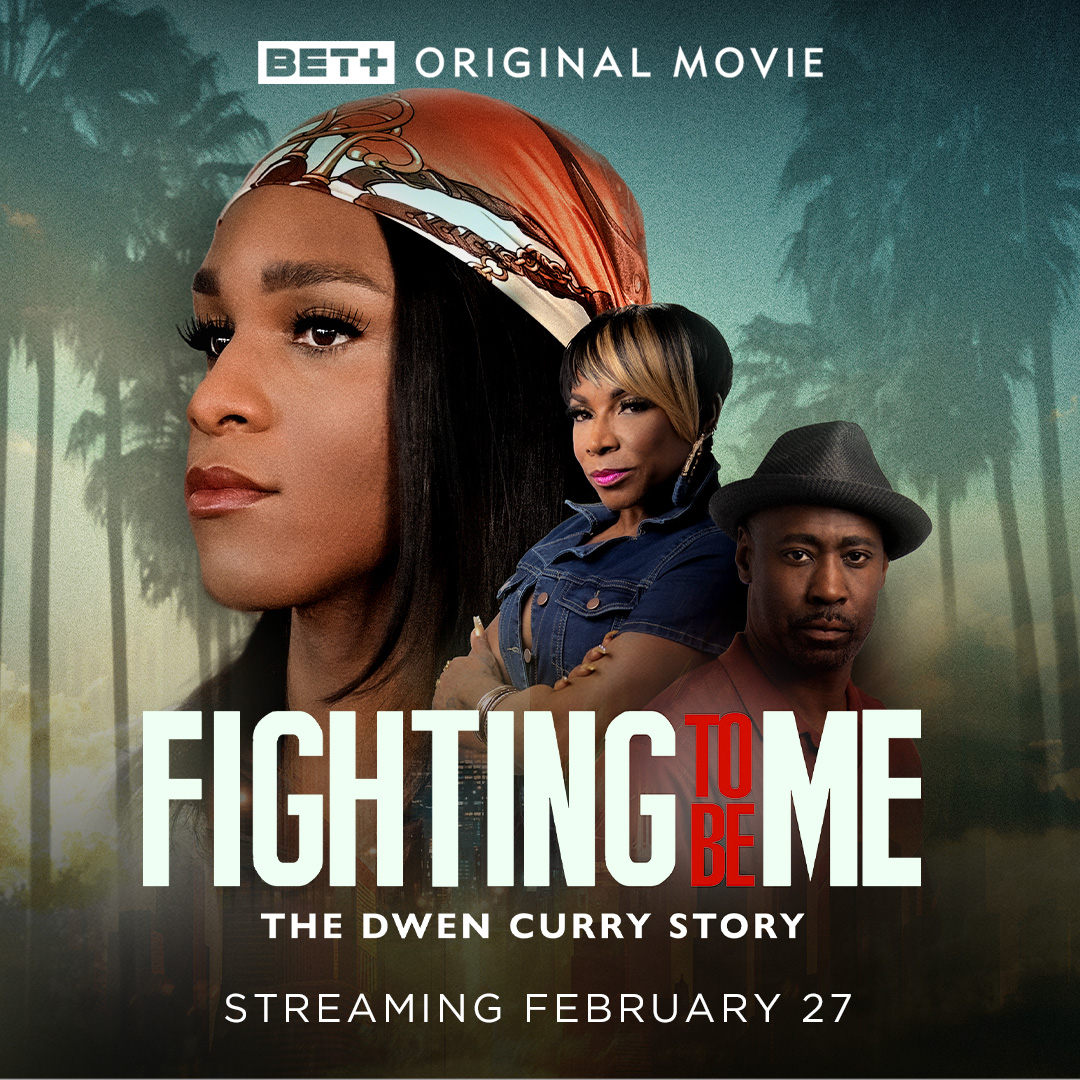
Actor Dyllón Burnside made an impressionable splash by playing Ricky Evangelista in FX’s Pose. Not only was he able to infuse sincerity and pathos into his role, but he has used his platform to speak against toxic masculinity, advocate for LGBTQ safe spaces and inspire activism.
Recently, he has partnered with BET+ for the film Fighting To Be Me, playing perhaps his most ambitious role to date. Dyllón plays Dwen Curry in a new biopic where he plays a celebrity stylist known for working with big names like Missy Elliott, DMX, Mariah Carey and more.
Leading a double life in many ways, Dwen also spearheaded a multi-million dollar fraud ring that came to be known as The Gay Gangsters. The film is part true crime, part Hollywood glam and all LGBTQ+ storytelling. The film is about family, identity, survival and self-acceptance as Dwen transitions from a gay man, to a proud transgender woman.
The film comes at a crucial time, where the nation is experiencing cutbacks in DEI initiatives that are affecting both the Black and the queer community. Fighting To Be Me is the latest in BET+’s efforts to highlight stories from the queer community.
Representing both the Black and queer communities in this film, it was essential for Dyllón to portray Dwen in a way that was both truthful and sincere.
We chatted with Dyllón ahead of the film’s premiere about his experience.
“It’s unlike any other project that I’ve been a part of. I have my processes and the things that I do as an actor to prepare that are my baseline. It’s rooted in my background in the theater and the things that I learned from my teachers in drama school and the different directors that I’ve worked with.”
But this process, while those things definitely helped Dyllón, there was so much of that, that Dyllón couldn’t pull from. He says he had to really stretch himself to immerse himself in Dwen’s story and world.
“I had a lot of conversations with her. It required me to be more curious than I think I’ve ever been in a role. I’m a seeker in that way, and I think that’s what I really love about working as an actor is really that process of discovery and getting curious and finding connections and doing the research. I love that kind of stuff.”
Dyllón was not familiar with Dwen’s story at first. After reading the script, he was compelled to tell her story, but it was imperative that he received the blessing from Dwen herself.
“I needed to have a conversation with her to make sure that she wanted me to play her. I wanted to be clear that this person, this trans person wants me to play them and they feel like I am the right person to portray them in this story. We had a beautiful conversation and it was that talk, just getting to look her in her eyes and understand her heart that made me decide I want to be a part of this project.”
Fighting To Be Me comes at a time when the nation is divided. Dyllón’s involvement as both the star and as one of the film’s executive producers is a testament to his belief that now is the time for this story to be shared.
“When we look at the times that we’re living in, when trans people are being attacked daily by the current administration, it is really troubling. The dehumanization of trans folks has gotten out of hand. I think we need to all have the opportunity to sit with the fact that my lived reality is not the same as someone else’s reality, but that doesn’t make their lived reality any less human or any less important or any less true.”
“I think that one of the beautiful things about this story is that it’s unlike any other story that I’ve ever heard or told. Yes, there’s the trans element, but it’s a full life story. It’s important to talk about trans issues as a means of advocacy. I’m also really interested in talking about Dwen Curry as a human being. What are the circumstances that conspired to create the situations that forced Dwen Curry to make the decisions that Dwen Curry made? We’re talking about the socioeconomic climate of the eighties. We’re talking about the politics of the eighties. We’re talking about HIV and AIDS. We’re talking about the stigma around being queer. We’re talking about poverty. All of these issues conspire to create a situation where the wind has to make certain decisions in order to survive and thrive.”
According to Dyllón, the story directly relates to what is happening right now. He elaborates:
“So many of us find ourselves in that position right now where there are all of these different systems and institutions that seem to be closing in around us and putting us between a rock and a hard place. We have to figure out how to stay true to ourselves. How do we protect ourselves? How do we eat? How do we stay safe from the cops shooting us down in the streets or from some person who hates us because of the color of our skin, or our gender or sexual identity? All of these things create a situation for people that drives them to make really hard decisions. And I think I’m more critical of those systems than I am the individual who is forced to exist in those systems.”
BET+’s inclusion of queer stories is a milestone. Typically, minority programming was resistant to talking about queer people. As part of that representation with Pose and now with this film, Dyllón has his take on the growing trend of inclusion.
“I may not say that minorities don’t celebrate folks, but I will say that historically we’ve seen that the media companies across the board have not supported stories. I think folks see we’re able to recognize the cultural impact as well as the fiscal benefits of telling more inclusive and expansive stories about who we are, who we get to be. I hope that continues. I hope we continue to see that in spite of all of the efforts to roll back DEI, and that media companies will stand firm in their commitment and desire to tell stories, real authentic stories about real authentic people.”
Totally giving himself over to the portrayal of Dwen on her journey of self-discovery and acceptance, Dyllón has started to look at his own relationship with identity and being true to himself. It is the message he has for himself, it is the message he has to his fans.
“One of the things that I’m really striving for in my life is integration, this idea that I don’t have to be a separate human being with my family that I am with my friends, that I am at work on set, that I am on stage, performing my music, that I am in the recording studio, that I am when I give a speech somewhere as the advocate in a political space. I don’t have to compartmentalize myself in those ways and I get to bring all of myself to every space that I’m in, even if that means I’m overwhelmed, or I’m tired, or I’m stressed, or I’m afraid.
The conversation that I’m having with myself in this moment, and by extension having with my audience, is this message around integration. And standing firmly 10 toes down in the truth of who I am and allowing that to be messy and allowing that to be uncertain and weird and to be unapologetic about the messiness and the weirdness and the lack of clarity.
Just show up as your full self wherever you find yourself and trust that your spirit will lead you and guide you in the way that you should go. Unplug from social media and get outside.”
Fighting to Be Me: The Dwen Curry Story is now available on BET+
a&e features
Margaret Cho Returns to Music with ‘Lucky Gift’
In her first music release in 8 years, Margaret Cho is back with a new album…and a lot to say!
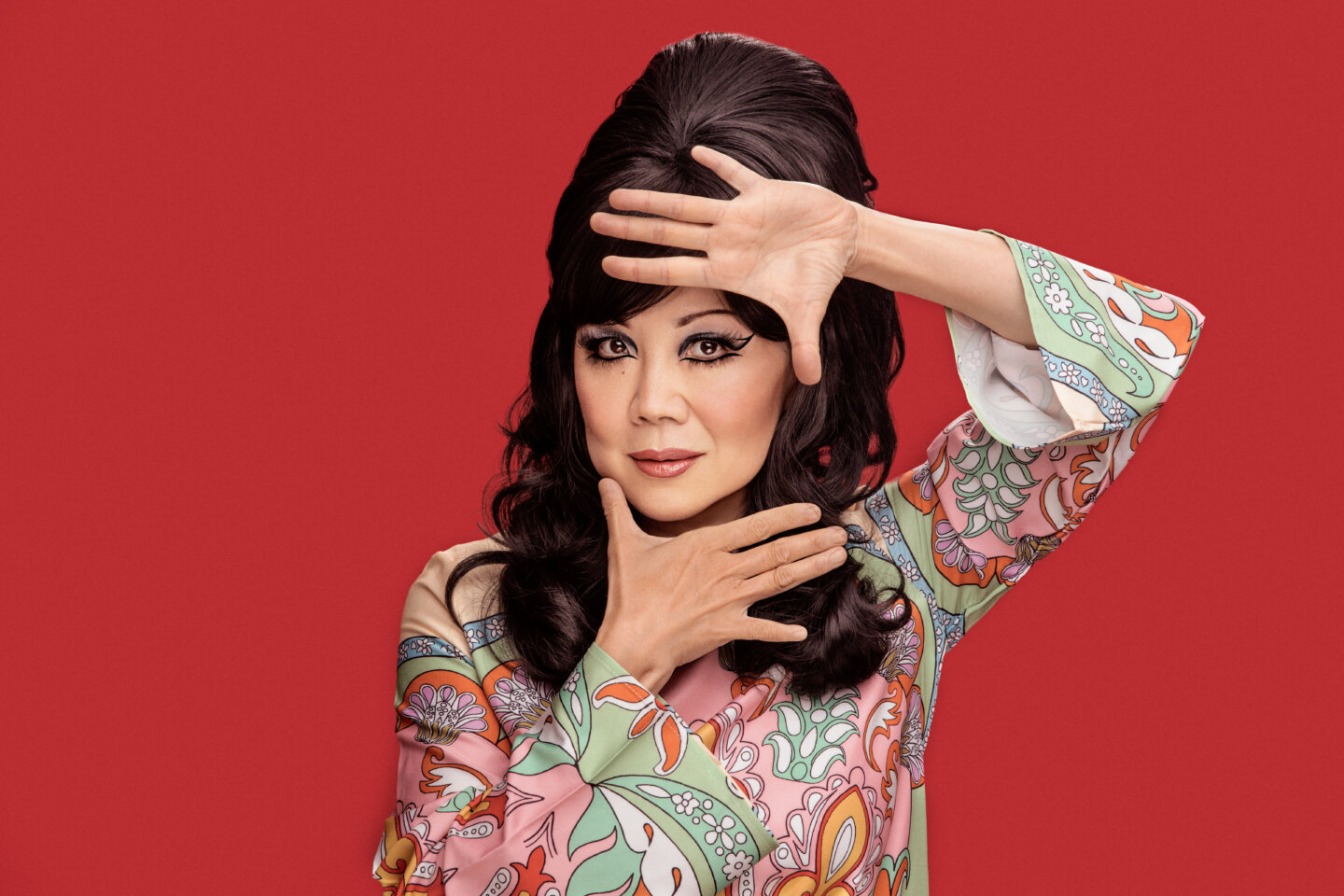
It has been 8 years since Margaret Cho released her Grammy-nominated American Myth album. She’s back to the music scene with her new album, Lucky Gift, an 11-track collection of anthems and pop tunes, a tribute to Robin Williams, and a shout-out to non-binary and gender non-conforming people.
The album captures the whirlwind that is Margaret and all of the different facets of her talents that have made her a powerhouse in entertainment and a leader in activism. In Lucky Gift, she’s getting her point across while having fun and getting glam.
We caught up with the activist and artist to chat about her music, our political climate, and
Known for her comedy, acting and activism, she felt it was long overdue to get her music back out there too.
Cho shares some insight on her next moves:
“I make music often. It’s a part of my daily life, it’s a big part of my social life, and it’s just something that I just love to do for my own relaxation and fun. I had enough for an album and I wanted to finally put them out. I was just really proud of how it all sounded together,” shares Cho.
“It’s a power pop record. For me, the songs are really meaningful. They’re all in their own way love songs. I’m a big fan of my own music (laughs), I really like the way that I sound and it’s really special to do. People know me as a comedian, and I have also made music for a long time, but it’s sort of a side project, and so it was time to put more out again.”
Her album also includes a touching tribute to Robin Williams. The entertainment community is finally more comfortable talking about mental health more openly. When relating mental health to her own life, Margaret, in true Margaret form, quickly turned the conversation to reflect today’s political climate.
“I have to maintain a level of peace and quiet and sometimes maybe get away from the news, although that’s tough because I am obsessed. I want to know what is happening. I’m really worried for our community, especially the trans community. I’m worried that this Administration is trying to separate T and the Q from the LGBTQIA, and it’s really frightening.”
As an elder, Cho says she has to also remember that we’ve been through this before and it’s actually been much worse. The LGBTQ+ community has been through a similar situation and at that point we were facing down a pandemic which was killing the community by the millions. Now, Cho says at least we don’t have to fight AIDS, as well as this onslaught of homophobia.
“We have fought for our rights, and we still have them, but we may not have them for long. So our mental health is very important to preserve now because we have to fight. The one thing to remember is they can’t do everything at once. They can’t take away trans rights, queer rights, gay rights, gay marriage, antidepressants (ha!) at the same time. So what we can do is just try to remain as calm as possible and fight as strongly as we can. But yeah, mental health is really vitally important right now.”
Cho’s long history of queer activism stands for itself. She does not shy away from current issues, she uses her platforms to incite, educate, and question. For Margaret, there is no time off from being an activist. She was born into it, so to speak, being raised in San Francisco in the 1970s, her parents the owners of a gay bookstore and their employees, followers of Harvey Milk.
“My activism is that I don’t have a choice. I’m going to be an activist no matter what. We’re doing this together, we’re going through this together. I will always be political. It’s just disheartening to see the ignorance of people and the lies that are being told that are believed.”
Lucky Gift comes at a perfect time when the queer community can come together over music. Cho looks at her album as a tool to empower an underdog community through the power of music.
“It’s the triumph of pop above all. We need to look to our pop divas above all. So now I’m more than ever, leaning on Madonna. Thank God for [Lady Gaga’s] “Abracadabra” because I think that things like that boost our community so much. When you can just get together and have a “brat summer,” that boosts our community so much in this togetherness, this explosion of excitement. I think Chappell Roan really ignited the pop capacity for healing. I love Lucky Gift because it is my stepping into a pop diva moment. Pop Divas should not be discounted for how important they are to our society and how much they lift us up.”
In addition to releasing her new album, Margaret will continue to hit the road this year with her Live and LIVID! Tour, celebrating over four decades of live stand-up shows. On this tour, she promises to rage about homophobia, sexism, racism, and the fight to stay alive. The five-time Grammy and Emmy-nominated performer is not holding back. According to her, the nation is not divided, just a little lost.
“We’re not divided. Everybody hates this. We all hate this. The fact is, the majority of the country does not want this. Unfortunately, a lot of people just didn’t vote because they just didn’t want to participate. That’s why we’re in the situation that we’re in. So to be on the road is a pleasure. And I rarely come against opposition. Every once in a while there’s something, but it’s something that we all handle. I think we all need a voice, a strong voice of reason to combat all of the hysteria.”
And her message to her fans?
“We’ll get through this. We’ll get through this with Pop Divas. “Abracadabra,” learn the choreography, you do it sitting down. At least we have pop music, I have my hat in the ring here. But at least we have each other and we’re going to be okay. It’s going to be a ride, it’s going to be intense, but we can do this. We’ve been through this before and we are going to be fine.”
Lucky Gift is now available on all major streaming platforms
a&e features
Saldaña triumphs amid ‘Emilia Pérez’ collapse at Oscars
Karla Sofía Gascón loses top award to Mikey Madison after scandal

It’s no wonder the camera caught actress Michele Yeoh crying after watching queer singer Cynthia Erivo (nominated for best actress) and Ariana Grande (nominated for best supporting actress) perform one of the much-loved songs from “Wicked,” as they were simply magnificent.
Grande opened with Judy Garland’s “Somewhere Over the Rainbow,” and Erivo sang “Home” from “The Wiz.” That was one of the many bright spots in the 97th annual Academy Awards, which took place Sunday night at the Dolby Theatre in Hollywood.
While the duo sadly didn’t take away any awards, the magical film did — gay costume designer Paul Tazewell won the Oscar for Best Costume Design.
“This is absolutely astounding,” Tazewell enthused onstage, in his acceptance speech. “Thank you Academy for this very significant honor. I’m the first Black man to receive a costume design award for my work on ‘Wicked.’ I’m so proud of this.”
In the pressroom, Tazewell elaborated on his well deserved win.
“This is the pinnacle of my career. I’ve been designing costumes for over 35 years,” he said. “Much has been on Broadway and now into film, and the whole way through there was never a Black male designer that I saw that I could follow, that I could see as inspiration. And to realize that that’s actually me, it becomes a ‘Wizard of Oz’ moment, you know, it’s like no place like home. So to come back to the inspiration being inside of me was — is really remarkable.”
Tazewell said he achieved the award with the help of a lot of really amazing and talented costume artisans of all types and an amazing staff and assistants and crew.
“Because, you know, there’s no way for me to do it alone! And that also is my greatest joy — to be collaborating with other very talented artists, so I respect what that artistry is, and I share this with them because I value what their input is.”
The veteran costume designer knew the movie was going to be pretty spectacular, but he was “absolutely blown away,” because of their approach.
“We were working on two films at the same time. It wasn’t until I actually saw a pretty complete cut that I actually experienced the journey that we have created for audiences. And so, to experience that –I was beside myself. And it defined why I do costume design, why I am a costume designer.”
“Wicked” also won the Oscar for Best Production Design.
“Emilia Pérez,” Netflix’s mesmerizing Spanish language, trans crime musical, had a whopping 13 nominations, with first-time nominee Karla Sofia Gascón making history as the first trans woman to be nominated for best actress. This would have been the most nominated foreign film in the history of the Academy Awards.
Unfortunately, after the controversy surrounding her past tweets, the film only won two awards: for best supporting actress (Zoe Saldaña) and best original song (“El Mal”).
While the U.S. is in an era of anti-trans political maneuvering, Sunday night’s broadcast included no mention of trans people.
In the pressroom, during an interview with “Emilia” composers Clément Ducol, Camille, and director Jacques Audiard, a journalist asked if anyone wanted to address what was happening.
Speaking in French via a translator, Audiard said, “Since I didn’t win Best Film or Best Director, I didn’t have the opportunity to speak, but had I had that opportunity, I would have spoken up.”
Saldaña, who starred as Rita, a lawyer who gets enmeshed with the trans cartel leader’s transition, was thrilled to win.
“I am floored by this honor. Thank you to the Academy for recognizing the quiet heroism and the power in a woman like Rita. And talking about powerful women, my fellow nominees, the love and community that you have offered me is a true gift, and I will pay it forward. Thank you so much Jacques Audiard, you are forever a beloved character in my life. Thank you for taking the interest, thank you for being so curious about these women to tell this story to my cast and my crew of ‘Emilia Pérez.’”
Saldaña’s nephew is trans; a few weeks ago, while winning the best supporting actress at the BAFTAs, she told journalists that she was dedicating the award to him.
“I’m dedicating all of these awards and the film ‘Emilia Pérez’ to my nephew, Eli. He is the reason — they are the reason — I signed up to do this film in the first place,” she said. “So as the proud aunt of a trans life, I will always stand with my community of trans people.”
a&e features
David Archuleta celebrates his freedom
The American Idol alum channels George Michael with his latest single
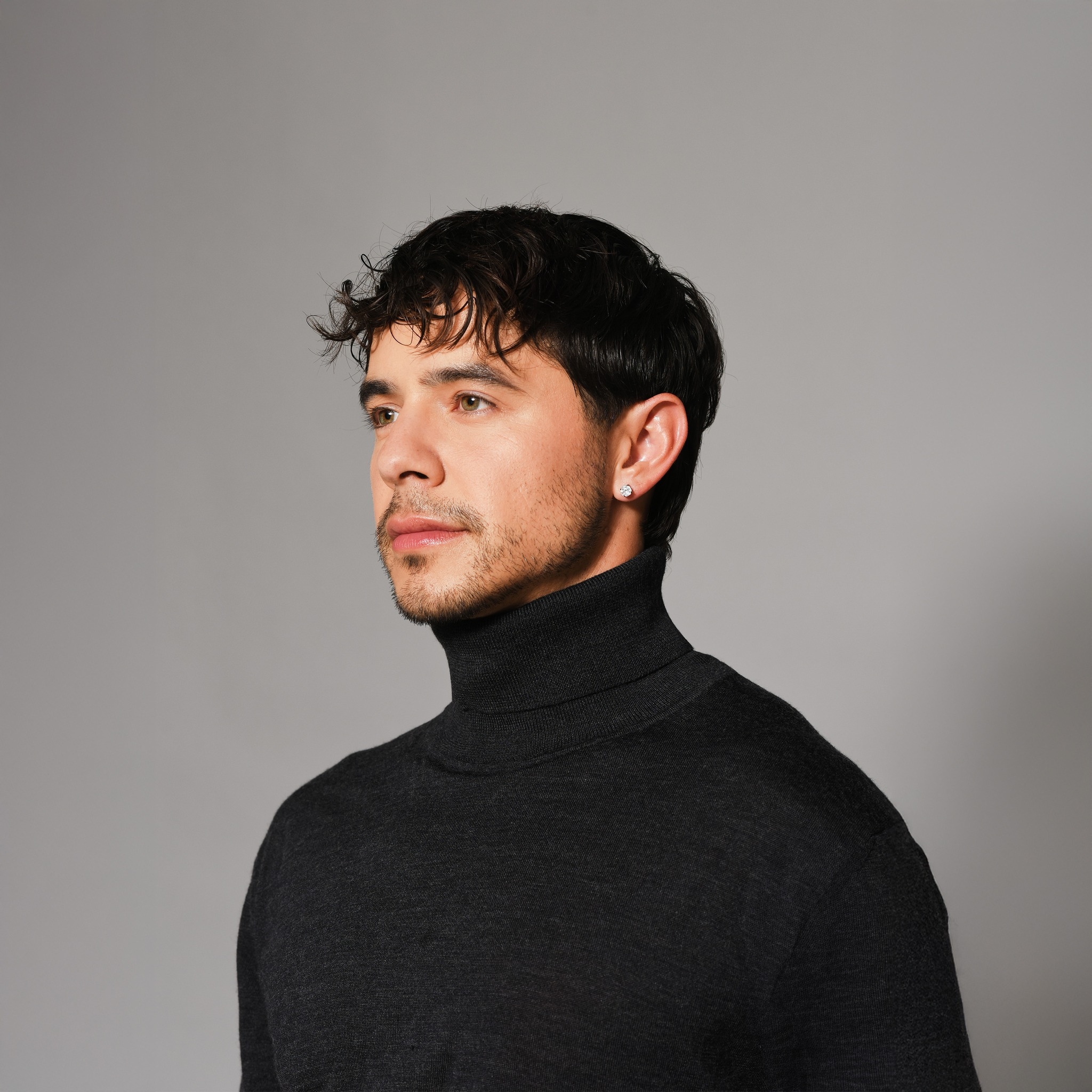
Even the rain couldn’t keep the crowds away as American Idol alum David Archuleta took the stage at The Abbey in West Hollywood, celebrating the release of his latest single “Freedom,” – an homage to George Michael’s iconic anthem. “Freedom” comes on the heels of the 35th anniversary of the original anthem and it couldn’t be more timely as the LGBTQ+ community continues to face political persecution. The song celebrates Archuleta’s newfound freedom after coming out and dealing with a complicated relationship with his Mormon upbringing, while exploring his sexuality.
Archuleta happens to have been born the year Michael released “Freedom.” His music served as an inspiration in Archuleta’s coming out. Michael’s music took on new meaning for Archuleta, celebrating a freedom that he craved for himself growing up. Being able to pay homage to Michael is a testament to the personal growth Archuleta experienced since coming out in an Instagram post in 2021.
“I’m finally free from worrying about what is right. Does that look okay? Am I within the lines I’m supposed to? None of that really matters. Of course, we want to still be good, but the things I thought I needed to do, or the way I had to behave or act or say or think to be good, I now realize was a construct that someone else had. They were very black and white and the community that I was in created this safe little space that worked to an extent for certain people,” said Archuleta in an interview with LA Blade.
“Now I realize that they didn’t have all the answers that they told me and convinced me that they had. Sexuality, especially when it comes to queerness, is not what they thought it was. I can go ahead and live my own life now and it’s okay to explore that sexuality and sensuality. I’m an adult. It’s the freedom to explore yourself and also create a new identity in yourself after trying to live someone else’s idea of what you’re supposed to be your whole life up until your thirties.”
Archuleta’s vocals are soulful and mature here. He pays homage to the original, but also makes it his own.
“I thought it was a great message to tap into. It is an iconic song with an iconic video and quite the story that he had. He was a pop star, a heartthrob, and didn’t choose to come out. He got outed and he just owned it. There could have been a lot of other ways to go about that and I feel like the way he did it was so powerful and made him even more legendary because he really tapped into his sensuality and continued to consistently be one of the greatest pop stars in the world,” said Archuleta.
“I tried to stay pretty true to his version. At first, we actually made a dance version of it but decided to backtrack from it and say, you know what? This is George’s legacy and it’d probably just be better to just stay true to his energy that he put into it. And also stay more true to my energy. I decided to stay true to an MTV unplugged version that he did with a choir. I have gospel roots. I still love gospel music even though I don’t believe in it and what it’s saying and the messaging like I did before,” he reflected.
“It used to be everything for me, the performance in the emotion and the way you connect in your core to singing. I thought it was a beautiful way to combine my two passions of moving forward and being free, but also loving the soul in music. I felt like there was some great soul energy in there. I was able to get really gritty, even get a lot of growling, something I haven’t done for quite a while, I feel like in my music,” he said.
“Freedom” comes at a time when every day LGBTQ rights are being called into question. The timing is not lost on Archuleta.
“I think it’s unfortunate that the LGBTQ+ community always has to be targeted because of being a smaller group. Living our lives does not really enter fear with anyone else. But because fear-mongering works in the news, it works in politics, it works in rallying people behind someone to feel like they have to fight this cause. They are blaming the community for issues and fear-mongering and feeling like the queer community’s a threat to families and to religion. When a lot in the queer community are religious. They are actively participating and fully believing and are a part of families. They have children of their own. It’s just strange that politics click baits and instills fear to not take responsibility for the real issues that are actually impacting people. We were making great progress. It was so much easier for me to come out when I did versus when George Michael came out and now it’s back to a place where the fearmongering is getting people, especially the trans community.”
Archuleta’s personal journey continues to evolve. He has certainly thrown off the shackles of being branded as the innocent Mormon kind on American Idol.
“I don’t really know what my brand is anymore. I think as I release “Freedom,” it’s kind of like a rebranding. I’m still me, but I’m still also evolving. I feel like I’ve changed so much in the last two years. I’m having a fun time. I keep trying to push my boundaries and say yes to things that I wouldn’t have before. Even to the point where I’m writing songs and writers will be like, “David Archuleta can’t say that!” I’m like, well, I just did and I’m David Archuleta. But people sometimes feel weird and I guess it’s because I’ve always been squeaky clean. I’m not a Mormon anymore. I’m out and I don’t really have this religious ideology that I have to abide by. I am David, but I don’t have the same limits on me that I had before.”
Archuleta has more new music on the way and this summer, he will release his memoir. Writing his book was bittersweet for David, revisiting his past came with a few bumps along the way.
“I feel like it was traumatic. I had to take breaks. It’s like opening Pandora’s box going into your childhood because I feel like sometimes I’m too honest. You see some of the faulty programming that you still have wired in you and you kind of question like, why am I still abiding by that? If it happened so long ago, why am I still letting it affect me? Why is it still part of my belief? I’ve had to work through a lot and it’s been a more difficult process than I thought it would,” he said.
“I thought it’d be hard to write because I didn’t know what I was going to talk about. But that wasn’t the hard part. What’s hard is processing the emotions, the anger, the grief, the anxiety, the traumatic responses you have. But it’s been good. I’ve definitely processed a lot of my religious things. I’ve processed a lot of my internalized homophobia and just sexuality in general. It’s been interesting to reflect on the root of all of those things. And not just ideologies, but just realizing it’s not just a belief, it’s sometimes your genetics that make you the person you are. A lot of good self-reflection for sure,” he continued.
Archuleta’s fanbase continues to thrive along with each evolution the singer has gone through. He is grateful for his fans and his mission to remain true to himself is also for his fans. There is sincerity and truth at the heart of his music.
“To my fans, thank you for being here still and for enjoying what I’m doing, for cheering me on as I grow, as I fumble. I didn’t think fumbling and making mistakes was okay to do. I thought that for some reason if you make mistakes, you’re supposed to be unforgivable. And to see how forgiving of a following I have to let me learn and to experiment and to explore. That’s why I relate to George Michael’s “Freedom” because he had to explore in front of people. And of course, you want to keep parts of your life private, that’s what I prefer. But sometimes things just end up being people’s knowledge that you don’t even know, like processing religion and coming out, sexuality and dating and getting to know people and even learning how to be physical with someone,” he said.
“I’m going to continue trying to figure myself out. But for people to be excited and for me to finally have this part of time of my life is great. I just hope we continue having fun, unleashing more, and freely being ourselves and giving us the grace to figure that out even if it takes some time,” he concluded.
“Freedom” is now streaming on all major music platforms.
a&e features
An invite-only LGBTQ+ app surged in popularity after Trump’s executive orders
Famm Connect provides a safe haven for job seekers and community support amid LGBTQ+ attacks
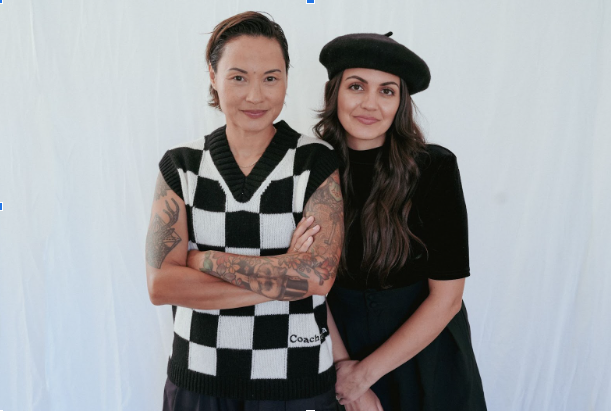
President Donald Trump’s latest executive order, restricting transgender individuals from serving openly in the military, has sparked a surge in activity on Famm Connect, a new professional networking app designed for the LGBTQ+ community.
The Secretary of Defense, Pete Hegseth, has a 30-day deadline for submitting a plan to execute the order. Until then, many have been turning to the invite-only platform, created in Dec. 2024, to find support, resources and career connections in the face of increasing change.
Its California-based co-founders and married couple, Marianna Di Regolo and Cat Perez, said their app has grown more than 70% within the last weeks. Di Regolo noted that the app provides a safe digital space for members fleeing those opposing their community.
“Famm Connect is our response to Trump and really anyone else who creates barriers for or discriminates against LGBTQ+ folks. So with Trump signing executive orders against our community and major organizations cutting DE&I programs and platforms like Meta removing protections for LGBTQ folks, spaces like Fam Connect are more important than ever,” Di Regolo told the Los Angeles Blade.
The LGBTQ+ community, according to Di Regolo, feels unprotected on other professional apps where hateful comments aren’t filtered, so her app serves as a haven for those looking for new jobs.
“Just in general, as a lot of us have seen, quite a few LGBTQ+ folks don’t feel safe on a lot of the other platforms, and they might be growing in their career or looking for a job or just looking to connect with other folks professionally,” she said, adding: “They’re on our platform letting folks know, ‘Hey, I’m looking for X, Y, and Z job,’… and they feel safer and more comfortable doing it in a secure space.”
As attacks on LGBTQ+ rights intensify—from political figures rolling back protections, advocates are doubling down on support for their communities, according to a spokesperson at GLAAD, a non-profit committed to LGBTQ+ advocacy and cultural change.
“Now more than ever, LGBTQ+ people are stepping up to take care of and support each other and our families. No matter what rhetoric is spewed [by] government officials or anti-LGBTQ+ extremists, our community and allies will persevere. Building community, finding and giving support, and making connections in spaces where we all can feel safe will be a critical part of surviving and thriving, no matter what we are up against.”
Trump said in his latest executive order against Trans troops that “For the sake of our Nation and the patriotic Americans who volunteer to serve it, military service must be reserved for those mentally and physically fit for duty.” This message didn’t resonate with Perez, who said Trump’s executive order is fear-mongering, among other things.
“It’s absolutely ridiculous. There’s no basis [on] which that decision was made. It is absolutely transphobia and a fear tactic that they are using and a general strategic tactic that Trump and his administration are using to distract the American people from real issues that they should be focused on for this country,” she said.
Perez also argues that his stance not only dehumanizes trans people but also ignores the reality that: “Trans people are humans. They’re human beings. “They’re absolutely capable of serving in the military, and they have, and it’s just disgusting that that is the message that he is putting out there.”
JaRel Clay, the vice president of the Board of Directors at SpeakOut, a non-profit that aims to create safe spaces across LGBTQ+ communities of color, says Famm Connect is a critical employment resource for “the trans community in the midst of attacks coming from the Trump administration.”
“We know that there is power in community, and especially for this community facing heightened risks, both in their areas and federally. An app like Famm Connect is more than a tool. It’s a lifeline,” Clay added.
Clay asserts that Trump’s rhetoric regarding the lack of mental fitness of trans-serving troops is “woefully uninformed.”
“How do you suggest that their military readiness and public service are at a disadvantage simply because they are trans? It’s, again, just woefully uninformed and ignorant,” Clay said. “It’s un-American. It is the fabric of our being that we address and assess the readiness of any individual who wants to serve our country based on the merit of how they perform.”
Perez said that she sees the LGBTQ+ community coming together and showing up for one another on the app since other platforms have censored terms like “lesbian” or other words about their community.
The Human Rights Campaign claims that Meta’s new social media policies “endanger LGBTQ+ communities.” Perez says censoring their communities is incredibly problematic, so they are building up Famm Connect.
“I think for folks who are struggling right now in the community, within their careers, I think seeking out the queer community and seeking out safe and intentional spaces and really making those connections is going to be the thing that helps get you through these turbulent times,” she noted.
Contributing writer, Eden Harris is a D.C. native with a passion for uplifting marginalized voices on a global, national and local level. She has experience covering the White House, Capitol Hill, the Supreme Court and federal agencies. She covers mainly all things Africa and is committed to doing so with the highest standards that drive true equity for the continent and its U.S. diaspora.
a&e features
While Meta and X roll back LGBTQ+ protections, Freddie holds space
Meet the tech power couple and their app named Freddie
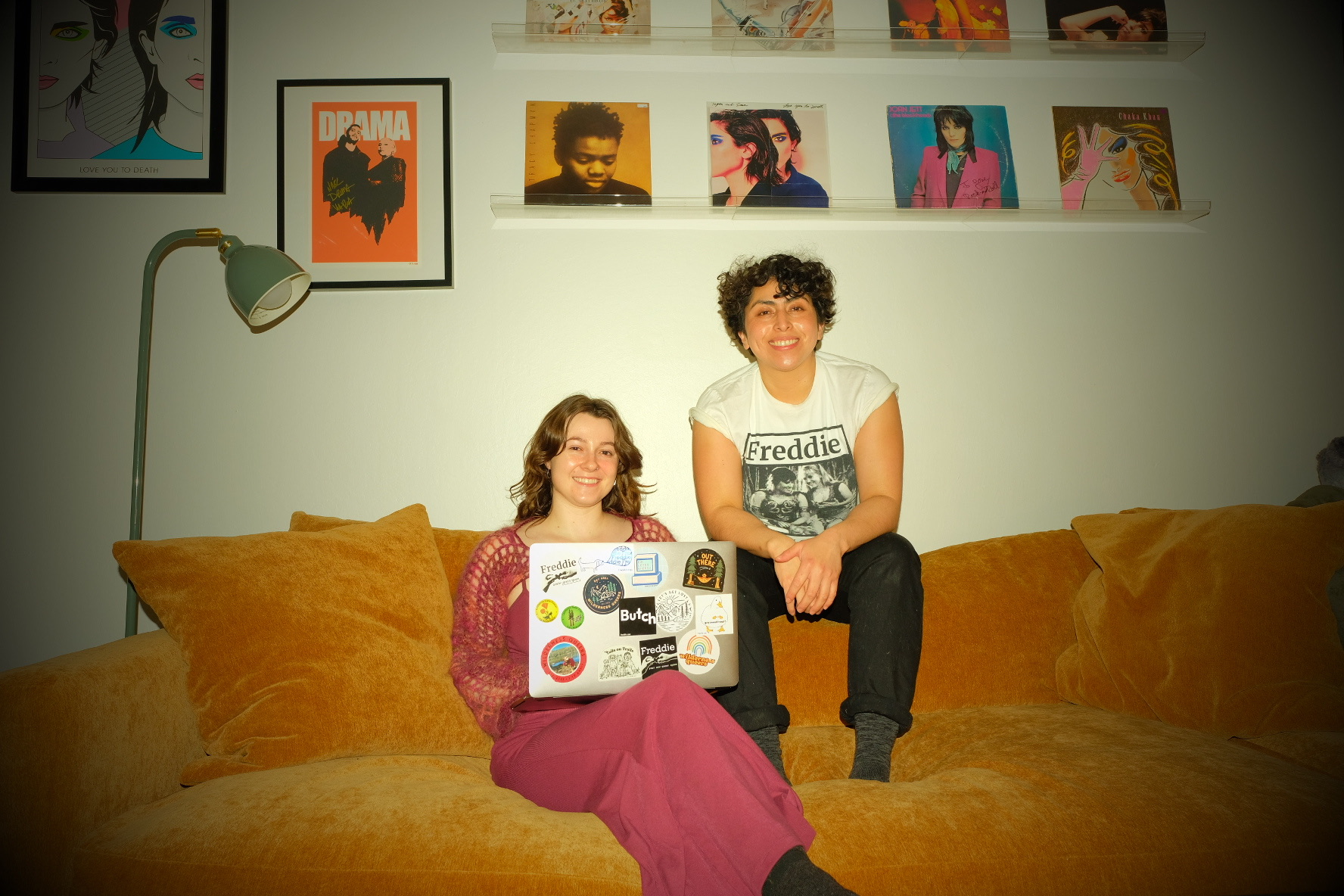
Ever dreamed of an exclusive digital space where you can find the community you are actually on the search for? Freddie: Your Queer Space, a dyke-centered phone application, was created just for that.
In an effort to create a digital space that would only welcome members of the queer, sapphically-inclined and trans communities, queer couple Carmen Hernandez and Sarah Panzer, put their collective skills to work and launched Freddie. This app comes at a time when it feels unsafe to exist in many other realms of the internet and social media apps like X and Meta, which have both scaled back protections for LGBTQ+ people and rolled back their diversity, equity and inclusion initiatives.
“The main goal for Freddie has always been to be that kind of third space that is unlike everything else we are experiencing right now on the internet,” said Hernandez in an interview with L.A. Blade. “There’s this fear that a lot of companies are using data security tools on social media platforms to track information about individuals.”
Hernandez realized that they had a unique opportunity to create something vastly different than what already exists on the app market. They not only wanted to create this digital space exclusively for the queer community, but also make sure that the information shared on the app was not being sold to data collecting companies.
According to the Federal Trade Commission, cookies and other data collection tools are meant to collect information from users such as interests, demographics and activity in order to ‘remember you.’ This means that user information is then sold to companies that collect and harvest that data to sell products and services to users through curated and personalized experiences. Research shows that this is a harmful practice because these curated and personalized experiences target users and make them vulnerable to scams and other dangers.
This app is an oasis in a desiccated digital landscape.
“We started thinking about how we could make Freddie really secure for the people that are there,” said Hernandez.

Hernandez and Panzer wear many hats in order to make this app not only function, but also evolve over time to include more helpful features – like personals – which they recently launched in an effort to unite people with common interests, goals and plans.
The ‘personals’ space is to post about their needs and find other like-minded community members who meet those needs.
“We’re a small team and we want to make an app that people are going to be able to use really easily, that they want to use and that has all the right features,” said Panzer. “We wanted to make a space where lesbians, trans people and queer people could have a space away from the cis-male gaze to just be horny, look for love, and just be themselves.”
Upon making a profile on Freddie, users are welcomed to choose up to six options for what they are looking for on the app. There are dozens of options – everything from music and book recs, to the meaning of life, and even options if you happen to be on the search for bottoms, tops and anything in between.
In comparison to apps that are not for or by the queer community, Freddie also has an extensive list of options for gender and sexual orientation.
Hernandez founded Freddie back in July of 2023, after they say they became exhausted with sifting through the other LGBTQ+ apps and realizing that there were a lot of issues with the interface and with people from outside of the community taking up space on the apps.
According to Hernandez, not only were they taking up space, but also being openly homophobic in spaces specifically meant to gather people from QTBIPOC communities.
“I started noticing that the people who were showing up, were sometimes not queer and then even worse yet, were straight and homophobic,” said Hernandez. “That all really got us thinking.”
This is when Hernandez decided to invest some of their own time, energy and financial resources to bring the concept of Freddie to fruition. Then, with the marketing help from their partner Panzer, they have now launched the newest and latest version of Freddie.
This isn’t Freddie’s final form, according to the creative couple.
Freddie will also soon have an even more exclusive membership option that operates like a digital club users can join in an effort to be a part of an even more exclusive space for the QTBIPOC communities.
“We are going to turn Freddie into a club and that’s going to make it a lot easier for us to monitor who comes in and ensure that everyone who comes into that space is able to engage with the community in a respectful way,” said Hernandez.
a&e features
Looking back at the 10 biggest A&E stories of 2024
Menendez brothers, Chappell Roan, ‘Wicked,’ and more

Reflecting on a year in queer entertainment is never one dimensional. You get stories of joy, hate, and everything in between.
And 2024 was no different. For every Chappell Roan, you get a J.K. Rowling. But looking back on this year is vital in recognizing what progress was made in LGBTQ spaces, and which areas need more attention to make a better 2025.
Though there are no 10 stories that are truly “the most important,” here are some events that represented the good, the bad, and the gloriously gay this year.
#10: Joaquin Phoenix abruptly exits gay film: “Joker” star Joaquin Phoenix reportedly exited a gay romance film days before production was set to begin, stirring up a controversial storm in Hollywood.
Sets were built and distribution deals were already made, which left many owed compensation.
Described as a detective love story featuring two men in the 1930s, the film was allegedly made to receive an NC-17 rating and to feature authentic and graphic sex scenes.
#9: Adele snaps back at homophobic fan:What better way to kick off Pride month this year than Adele publicly humiliating a fan who shouted a homophobic comment?
The singer was performing her Las Vegas residency show when an audience member shouted, “Pride sucks.” Her response was appropriately filled with profanities.
“Did you come to my fucking show to say Pride sucks? Are you fucking stupid?” Adele said. “Don’t be so fucking ridiculous. If you have nothing nice to say, shut up, alright?”
A video of the interaction went viral online, and fans rallied on social media to show their support of the singer.
#8: Oprah receives GLAAD recognition: Oprah Winfrey received the GLAAD Lifetime Achievement Award in March. It was a culmination of her strong history of support for the LGBTQ community.
Winfrey used her platform on her self-titled show to raise awareness of HIV/AIDS and LGBTQ bias and hold open discussions to challenge stereotypes and promote acceptance.
“Winfrey’s unique blend of empathy, wisdom, and storytelling resonated with audiences, making her one of the most beloved and influential figures in media history,” Los Angeles Blade publisher Troy Masters wrote.

#7: A new ‘Voice’:NBC’s hit singing competition, ‘The Voice,’ crowned its first LGBTQ winner after 25 seasons.
Asher HaVon, who performed on team Reba McEntire, became a staple on the show for his hypnotic and rich tone. From Selma, Ala., HaVon also represents the fight for equality.
When former President Barack Obama visited Selma in 2015, HaVon sang for him and 200,000 other people at the historic Selma Bridge crossing.
“For the rest of us, in the LGBTQ community, in the dance clubs, and in the hearts of ones needing a new diva to love, Asher has arrived,” Los Angeles Blade reporter Rob Watson wrote in May.
#6: Out and proud: Many notable celebrities came out this year, including country singer Maren Morris, track star Trey Cunningham, actor Julia Fox and former “Saturday Night Live” star Sasheer Zamata. From sports stars to country idols, these icons are paving the way for LGBTQ visibility in underrepresented entertainment spaces.
#5: Defying box office charts: Jon M. Chu’s “Wicked” is ‘Popular’ with audiences, to say the least.
Roughly one week into its box office run, it became the biggest-grossing movie based on a Broadway musical in North America. It beat previous smashes like “Grease” and “Mamma Mia!” Beyond providing audiences with a faithful yet unique adaptation of the popular book and play, it also gave us numerous viral interviews between its two leading ladies, Ariana Grande and Cynthia Erivo, as well as a plethora of fan cams gushing over out actor Jonathan Bailey.
Your move, “Wicked: Part Two.”
#4: Emmys and Grammys and Tonys, oh my!: It was a historic year for queer representation at the biggest nights in entertainment. Jodie Foster collected her first Emmy for her role in “True Detective: Night Country,” while Jonathan Groff accepted his first Tony for his role in “Merrily We Roll Along.”
The Grammys were huge for women and queer artists, recognizing performers like Billie Eilish, SZA, Miley Cyrus, and Victoria Monet. It was a much different story than in 2018, when Grammy organizers responded to a lack of female recognition by telling women to “step up.”
#3: Misinformation fuels hate at Olympics: Olympic boxer Imane Khelif was the center of right-wing rage during this summer’s Paris games after many prominent celebrities and personalities said she is transgender. Khelif has differences of sex development (DSD), which is a group of rare conditions that causes one’s sex development to differ from most others. Women with DSD can have both an X and Y chromosome, which is typically only found in men, but it doesn’t make one transgender or intersex.
The facts didn’t matter to public figures like J.K. Rowling and Elon Musk, who were mentioned in a cyber harassment lawsuit after spreading misinformation online about Khelif’s identity. Rowling labeled Khelif a “male” on X, while others called for Khelif to be banned from competing. This outcry over false claims about her identity overshadowed her gold medal win.

#2: The rise, not fall, of a Midwest princess: It was a stellar year for women and queer performers, headlined by Chappell Roan’s rapid ascension to fame. The singer drew global recognition with notable hits like “HOT TO GO!” and “Good Luck, Babe!”.
More importantly, as a member of the community herself, fame never got in the way of her pro-LGBTQ messaging. She dedicated her Best New Artist VMA win to the “queer youth in the Midwest.” Roan, who’s from Missouri, also used her platform to support the art of drag. She enlisted local drag queens to open her shows this year, and gained instant approval when paraphrasing Sasha Colby’s famous saying: “I’m your favorite drag queen’s favorite drag queen.”
#1 Ryan Murphy strikes controversial gold again: The ethical implications of “Monsters: The Lyle and Erik Menendez Story” were hotly debated when it debuted on Netflix in September.
Some loved the show’s aesthetic and its gripping portrayal of the two brothers who killed their parents in 1989. Others criticized it for its flimsy factual representation and glorification of murder through its two overly attractive leads. Whatever your opinion, there’s no denying the show’s impact, which sparked a national debate over releasing the brothers from prison early. With LA electing a new district attorney in November, the push for an early release remains in the headlines and a strong possibility.
Regardless of your opinion of the show, there’s no denying the cultural impact it sparked. Out creator Ryan Murphy isn’t new to producing shows that divide people while generating ratings. The first installment of the “Monster” anthology, centered on Jeffrey Dahmer, was a huge hit despite facing intense scrutiny for similar creative decisions.

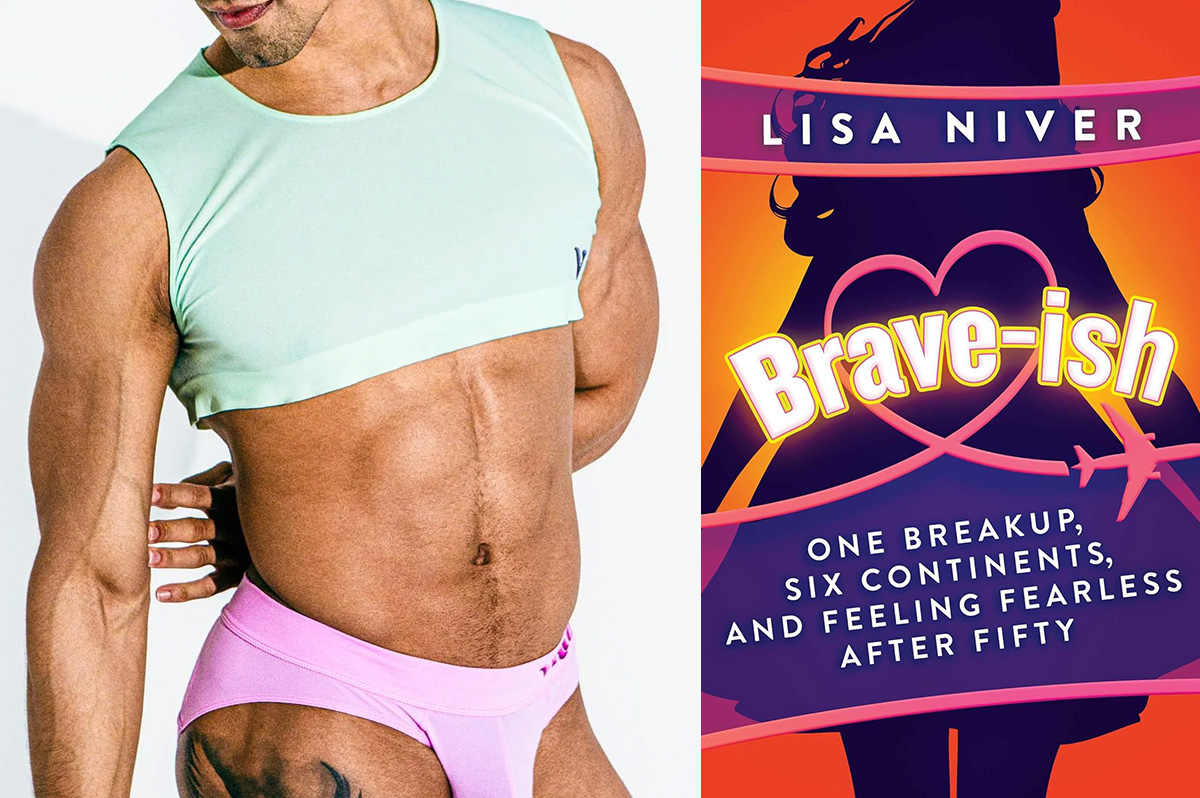
It’s been a rough year for many, and yet it is so important to find things to be grateful for. Hopefully, you and your LGBTQ loved ones have enjoyed the plethora of presents being offered throughout this festive season.
But if you’re stumped on what to buy, here’s our list of thoughtful gifts for him, her, and them. And with such a stressful world, always remember that gift giving doesn’t need to be reserved for holidays and birthdays — you can acknowledge your friend, family member, coworker or romantic partner at any time of the year.
Gender Fluid/He/She/They
Virtue is an intimates brand with a mission: create garments for anyone and everyone. Founded and designed by sustainable fashion designer Yotam Solomon, the brand fosters a diverse, sex-positive community of individuals. It’s no wonder the company has been nominated for Best Lingerie/Apparel Line for 2025– they make the first genderless jockstrap. Kristen Stewart was photographed earlier this year for the Rolling Stone cover, wearing the athleisure brand.
Virtue creates its products with what it calls a “True Unisex Fit,” meaning “sex is irrelevant when it comes to fit.” The Strap Briefs, for example, are sold both with and without a pouch. Sizes currently run from XXS to 4X, with the intention of introducing a wider range in the future.
Maurice Gattis is an outstanding LGBQT designer who has created gorgeous looks for men and women. He just launched his new line–FortMose1738, named for the first black community in the USA in St Augustine, Florida. The collection is made in Ghana from Kente and 100% cotton in a bold array of colors and patterns. The concept shines a light on Africa’s textile artisans. He goes to South Africa to work with homeless young people ostracized for their choice to be LGBTQ and is considered a leader in bringing awareness of the socio-economic factors driving LGBTQ homelessness. Prices start at $50 for a Kente clutch – up to $650 for a Kente suit, cotton dresses are in the $200 range and shirts for men start under $100.
Revive is a female owned and operated jewelry brand based in Southern California that is all about giving back. Their creator/designer, Nikki, offers some wonderful collections, each of which helps support a different cause. Revive is the only brand out there that incorporates cellular images into the creation of their stones, making them not only beautiful, but truly unique and impactful too.
Self Care
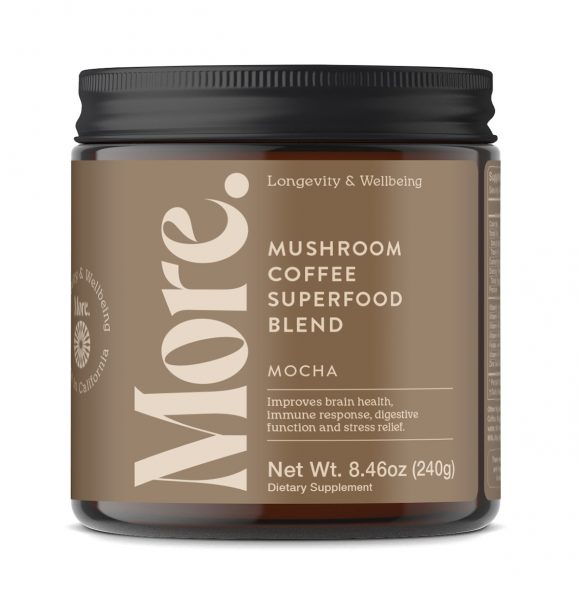
For the person who wants to take extra good care of themselves, check out More Longevity & Wellbeing, the lesbian-owned mushroom superfood blends/capsules company. Lower stress, elevate mood, and boost energy. Refresh. Restore. This blend was created to help your body adapt to life’s challenges with ingredients that calm the nerves and support relaxation. Mix a scoop in hot water to kick start your day! I love the mocha and banana coconut flavors!
Let’s face it, somehow we have to get through the next four years. For your favorite Democrats, how about the gift of cannabis to ease their discomfort?! Golden State is California’s #1 premium cannabis brand, known as the crème of the crop for luxury flower and pre-rolls. Minority-owned and the first carbon neutral certified cannabis brand, the below sets are perfect gifts for anyone – from the “canna-ser” to the “cannaicrious!”
Curated Cannabis Set – A unique set curated by A Golden State’s Head Cultivator himself, the set includes three delectable eighths that are consumer favorites. $145.00
• MOUNTAIN SHADOWS — a boldly nostalgic and terpene-heavy hybrid.
• ALPINE SUNRISE — the perfect sativa for any occasion.
•EMPANADAS DIEZ — the latest indica, first featured and revered at the 2023 California Zalympix Competition.
Connoisseur’s Choice SOIRÉE Set – The perfect set for sharing or unwinding solo, customers can select their two eighth strains and preferred mini pre-roll pack from A Golden State’s line of products. $118.00
For The Smoothest Skin
Sara and Ben Jensen are the founders of Hugh & Grace, a brand of hormone-supportive skin, health, and home care products that help men and women lead healthier lives and be aware of hormone disruptors that can impact physical health and infertility. They experienced unexplained infertility for 14 years before having two babies via surrogacy. Check out their body oil–great for after shaving and to remove makeup!
Burke Williams Skincare, renowned for its commitment to delivering top-tier, spa-quality products, is unveiling H2V—a pioneering line that promises to redefine how we approach hydration and skin vitality. The H2V collection is a meticulously crafted solution that integrates advanced hydration technology with the brand’s signature rejuvenating ingredients. burkewilliams.com
Auro Wellness
Auro Wellness is a cutting-edge LA-based wellness brand that combines revolutionary ingredients, advanced patented sub-nano absorption technology, and a straightforward system for healthy living – all crafted from the heart. Their star product is their Glutaryl Spray that optimizes antioxidant absorption and efficacy and delivers Glutathione to the body more potently than ever before. It aids in detoxifying the body of existing free radicals and improving one’s health in both the short-term and the long-term. aurowellness.com
Oxygenetix
Oxygenetix is a breakthrough foundation to cover, help heal and minimize – even eliminate – procedural scars. Designed for doctors, Breathable foundation covers and treats a wide variety of skin problems: skin injuries, wounds, rashes, cracked, dry skin, acne scars, rosacea and other skin conditions. On post-surgical scars, patients are re-assured and impressed that after care includes safely camouflaging any evidence of surgery. oxygenetix.com
SISH Beauty
SISH Beauty is not just another skincare brand; it’s a philosophy. Their mission is to pare away the noise and focus on what truly matters in skincare—effectiveness, mindfulness, and intentionality. The SISH Beauty Team understands that in the cluttered landscape of beauty products, simplicity and purpose are not just desirable but essential.The SISH Beauty In-Shower Facial Treatment is designed with your well-being in mind, incorporating sustainable practices. The SISH Beauty team strives to create a positive impact on both your skin and the environment, promoting a holistic sense of beauty and wellness. sishbeauty.com
For the One Who Loves Super Heroes
Filmland Spirits was born from an enthusiasm for whiskey, a passion for movies and a dedication to storytelling. They believes that every whiskey has a story, and every story deserves a whiskey. The result is a wildly creative pairing of an original retro B-Movie concept – complete with monsters, robot sand over-the-top plots – with a delicious and unique whiskey – each of which has already won a Gold Medal or higher. Even the bottles tell part of the story as they are custom-designed to reflect movie houses of the 1950s and feature movie posters as labels.
Their latest release — just in time for holidays is QUADRAFORCE, a blend of four straight bourbons, from four different states, each aged a minimum of four years. QUADRAFORCE tells the story of a parallel universe which exists during WWII. The forces of evil are winning, and following an atomic test gone bad, 4 average Americans emerge as heroes — each with superpowers. Can this fearsome foursome join together to defeat evil? Only time will tell. Watch the trailer here.
Great Books/Films to Inspire
If you’re looking for an LGBTQ holiday film worthy of a second cup of cocoa, Tello Films has the most lesbian holiday films available anywhere and truly knows how to make the season gay. Premiering this year is The Holiday Club (available now/subscription not required).
Romance proves elusive for a lonely, holiday-hating newcomer to a small, Ohio town in this dramedy written and directed by Alexandra Swarens (Looking for Her, Spring, City of Trees, LA Web Series), who also co-stars with Mak Shealy (Chronicle of a Serial Killer, Sarah Q).
Rent more yuletide fun from Tello in a special movie seven-pack for just $12.99 (30 days) that includes, in addition to A Holiday I Do, the acclaimed LGBTQ+ Tello holiday romcoms Christmas at the Ranch, Merry & Gay, I Hate New Year’s and Season of Love and two other holiday films from Swarens, City of Trees and Looking for Her.
Fuel your wanderlust with Lisa Niver’s inspiring travel memoir Brave-ish: One Breakup, Six Continents, and Feeling Fearless After Fifty. This award-winning book takes readers on an exhilarating journey of self-discovery, resilience, and adventure. Whether you’re lgbtq friends are dreaming of their next destination or need a nudge to embrace the unknown, Brave-ish is the perfect companion to ignite their travel dreams.
For those ready to turn their passion for travel into a creative pursuit, Lisa’s Udemy course, Travel Writer 101, is a great gift suggestion. Learn how to capture your adventures and share them with the world from a seasoned expert who has visited over 100 countries and built a successful career as a travel writer and TV host. Discover more of Lisa’s adventures on WeSaidGoTravel.com, catch her podcast Make Your Own Map, and follow her on social media @LisaNiver.
-
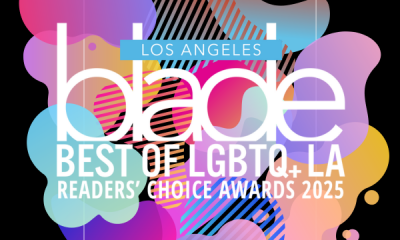
 Arts & Entertainment16 hours ago
Arts & Entertainment16 hours ago2025 Best of LGBTQ LA Readers’ Choice Award Nominations
-
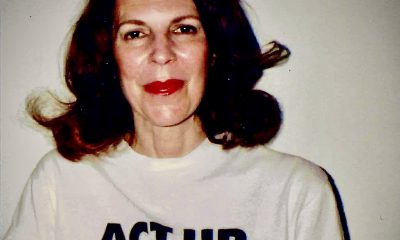
 Obituary4 days ago
Obituary4 days agoNanette Kazaoka, an unlikely AIDS activist, dies at 83
-
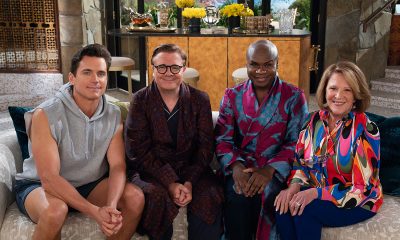
 Television5 days ago
Television5 days agoNo, ‘Mid-Century Modern’ is not a ‘Golden Girls’ remake
-

 Local19 hours ago
Local19 hours ago‘Think of those who have not been seen,’ Cynthia Erivo’s powerful message at GLAAD Awards
-

 Features17 hours ago
Features17 hours agoTristan Schukraft: Keeping Our Queer Spaces Thriving
-

 Opinions16 hours ago
Opinions16 hours agoGay bar in California bans MAGA gear — but no other political expression — from its premises
-
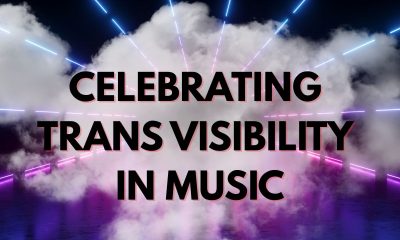
 Arts & Entertainment10 hours ago
Arts & Entertainment10 hours agoTrans Day of Visibility: Let us put you on 5 Latinx musicians you should be listening to right now

